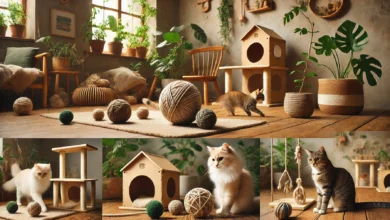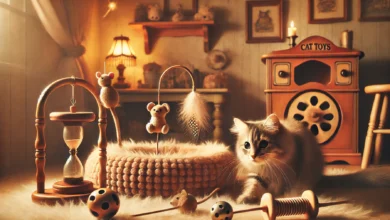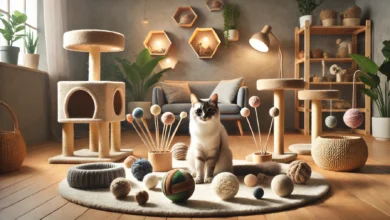Exploring Seasonal Toys for Cats
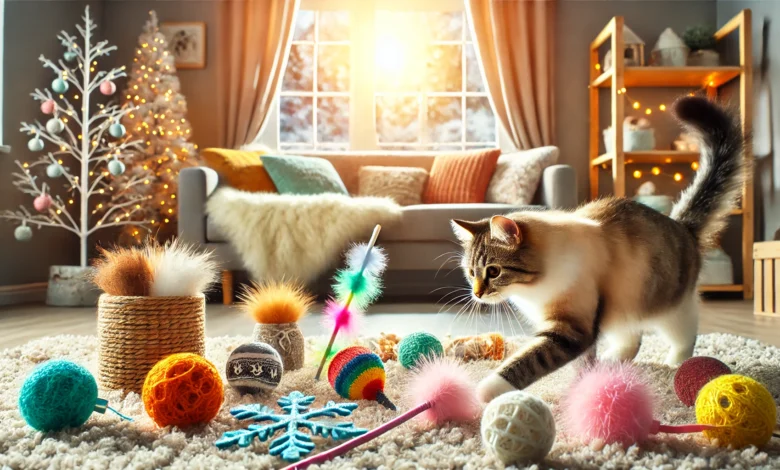
Cats are instinctively exploratory, and with the seasonal shift, so is their requirement for playtime.
Like all other beings, cats get bored repeating the same thing over and over again.
New and exciting seasonal toys make a big difference in their overall outlook.
That is exactly where seasonal toys come in.
These toys align with changes in weather, environment, and your cat’s behavior to keep them engaged, active, and healthy throughout the year.
Whether your feline friend enjoys a playful springtime feather toy or a cuddly winter plush, the options are endless to match the season and add fun to your cat’s life.
In this article, we’ll show how seasonal toys can enrich your cat’s life, offering benefits that go beyond simple playtime.
Let’s dive into all that seasonal toys have in store for your felines, starting with why these toys are important for your cat.
Table of Contents
Why Seasonal Toys Are Important for Cats
Keeping your feline friend entertained is not just about fun; it plays a huge role in their physical and mental health.
As the seasons change, so do your cat’s behavior, energy, and interests.
Seasonal toys help match their playtime needs with these changes, providing a variety of benefits.
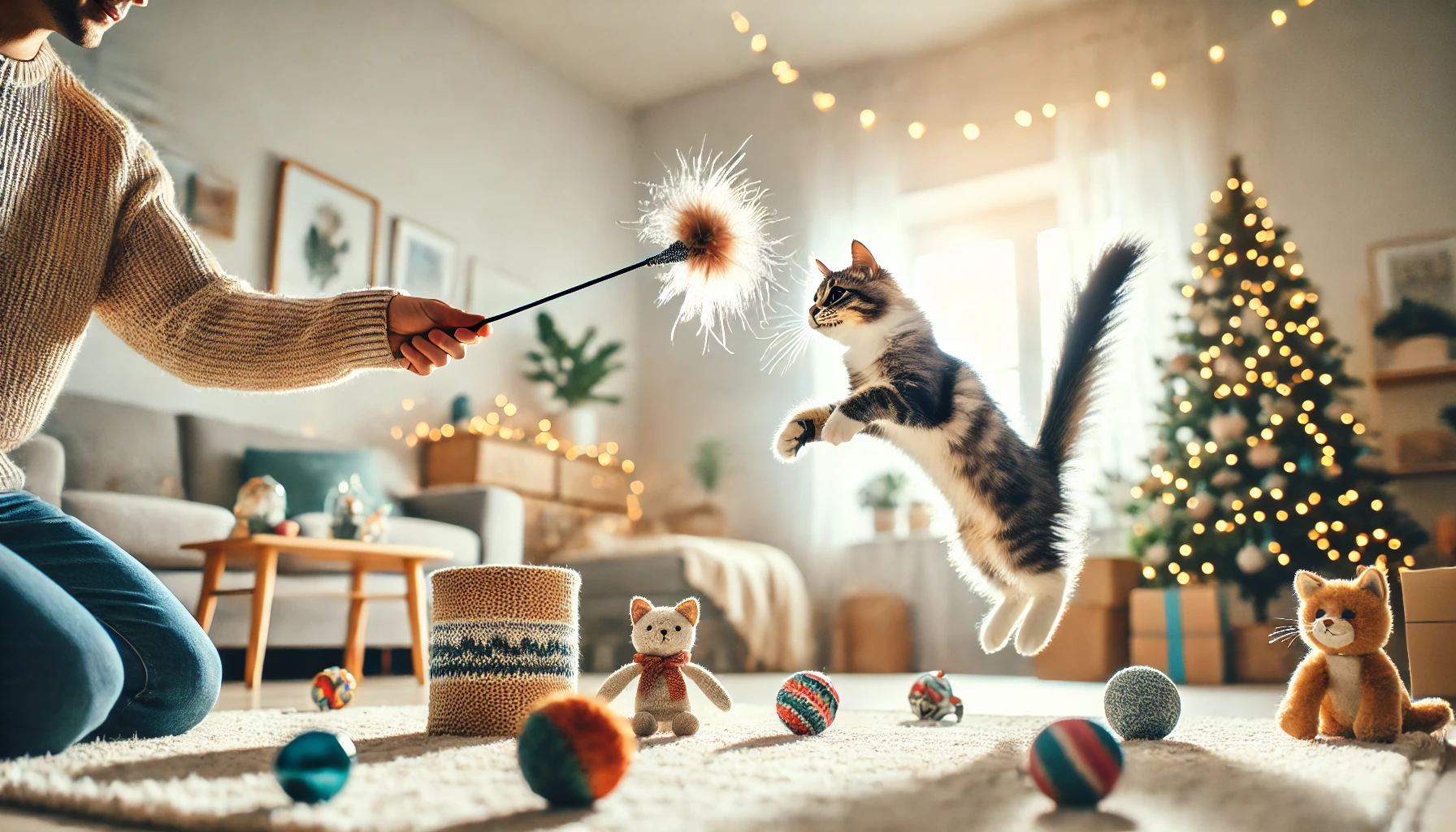
Improving Physical Activity
One of the most important reasons to introduce seasonal toys is to maintain your cat’s physical activity.
Toys that match the season can stimulate various movements, from running and jumping to pouncing and batting.
For example, lightweight summer toys can be used in fast chasing games, while heavier winter ones may encourage more swat-and-play indoor sessions.
By providing your cat with seasonal toys, you ensure that even during colder months, when your cat may become lazier, they stay active.
These toys will help increase their activity levels, ensuring a healthy and fit cat all year round.
- Spring/summer toys: Allow for natural outdoor play indoors with interactive toys such as feather teasers or lightweight balls that are easy to bat around.
- Fall/winter toys: Focus on cozy indoor play with plush toys or catnip-filled items that keep your cat entertained indoors.
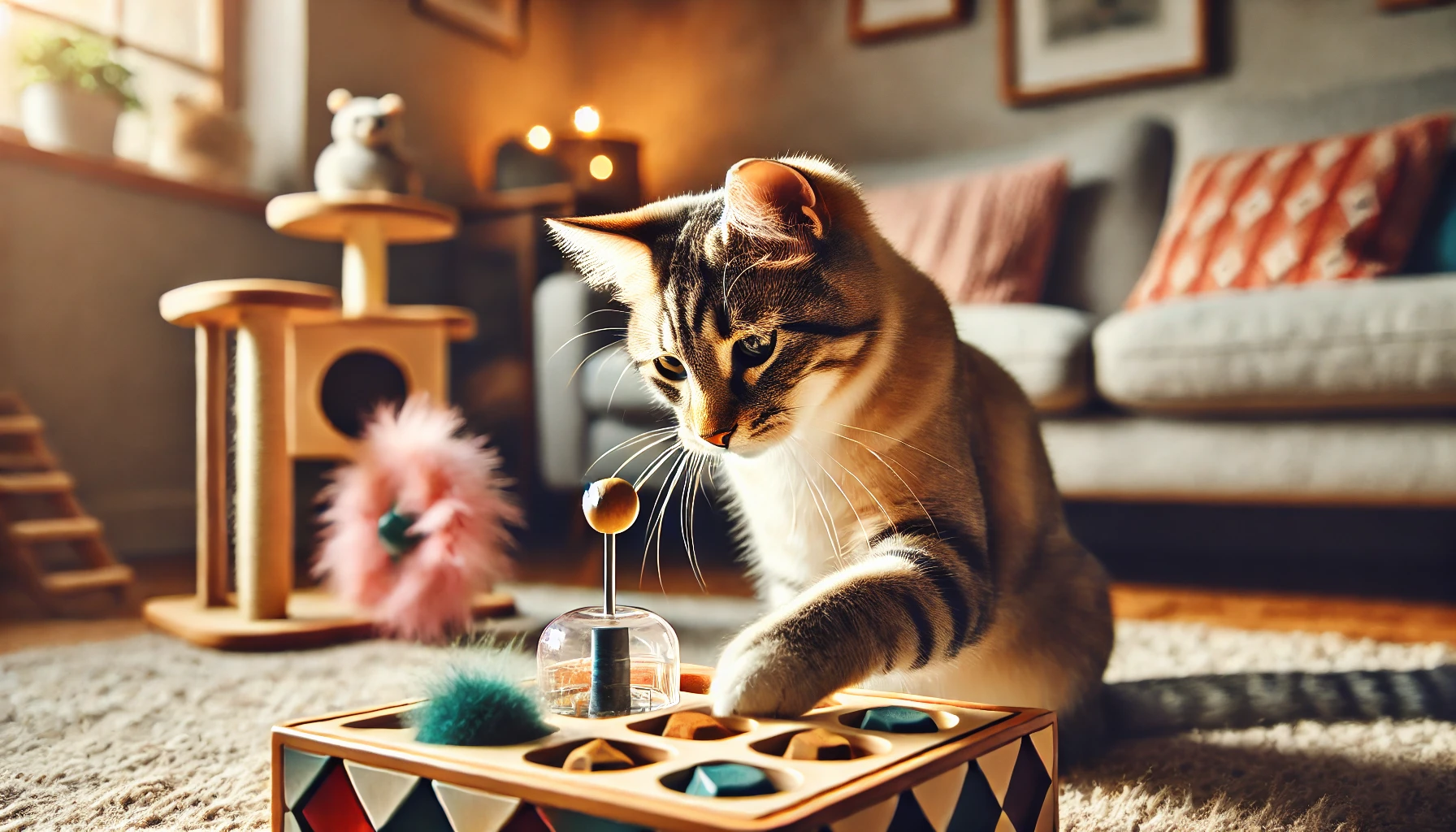
Mental Stimulation and Enrichment
In addition to physical activity, seasonal toys provide much-needed mental stimulation.
These toys can offer new experiences, allowing your cat to learn and challenge themselves.
Interactive toys that require problem-solving, such as treat-dispensing toys in the fall or hunting-style toys in the spring, will keep their minds sharp.
A mentally stimulated cat is less likely to develop behavioral issues such as scratching furniture or excessive meowing out of boredom.
Rotating seasonal toys throughout the year also prevents your cat from becoming bored with their playthings, as new toys bring new challenges and fun.
This variety keeps your cat’s brain engaged and curious, ensuring continuous enrichment.
Seasonal toys can help maintain your cat’s physical and mental health by adapting to their changing behaviors and energy levels throughout the year.
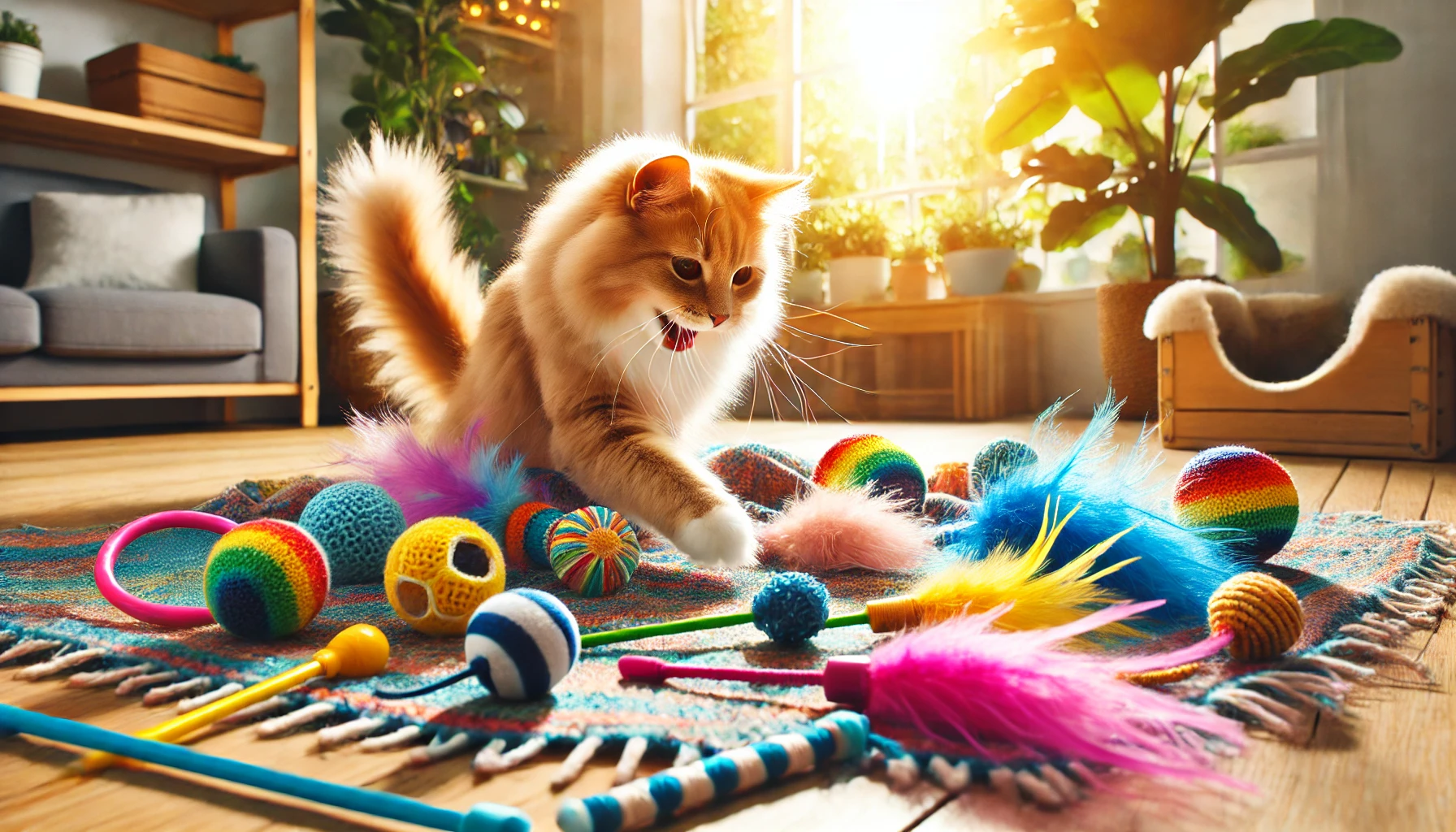
Popular Seasonal Toys for Spring and Summer
As the temperature gets warmer, so does your cat’s energy, or at least it’s supposed to, with the changing of the seasons.
Seasonal toys for spring and summer are all about encouraging outdoor-similar play—even indoors.
These toys offer hunting instincts, curiosity, and physical activities—all great for keeping your feline amused during the warmer months.
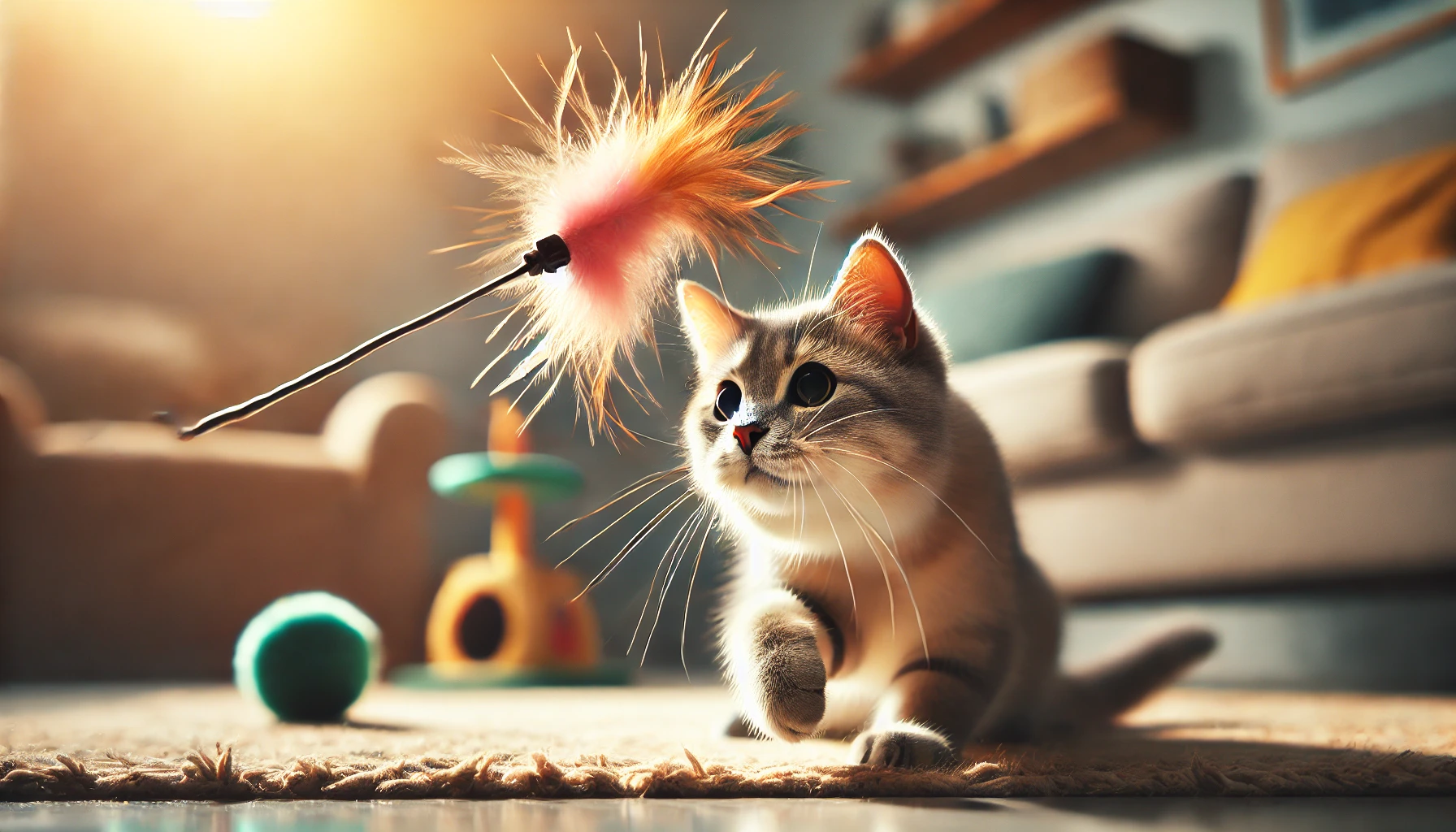
Interactive Feather Toys
Feather toys are always a big hit, but they really shine during the spring and summer months when cats have a bit more energy.
Feather toys can imitate birds in flight and fire up the hunting instinct inside your cat.
These toys are lightweight and often attached to a wand, making it really easy for you to engage in play with your cat.
You can also get interactive feather toys that include bells or catnip to tempt your cat even more.
They help your cat burn off energy while having a blast running and pouncing.
- Tip: Rotate feather toys periodically for fresh interest.
- Pro tip: Feather wands are great for bonding and help cats with coordination and timing.
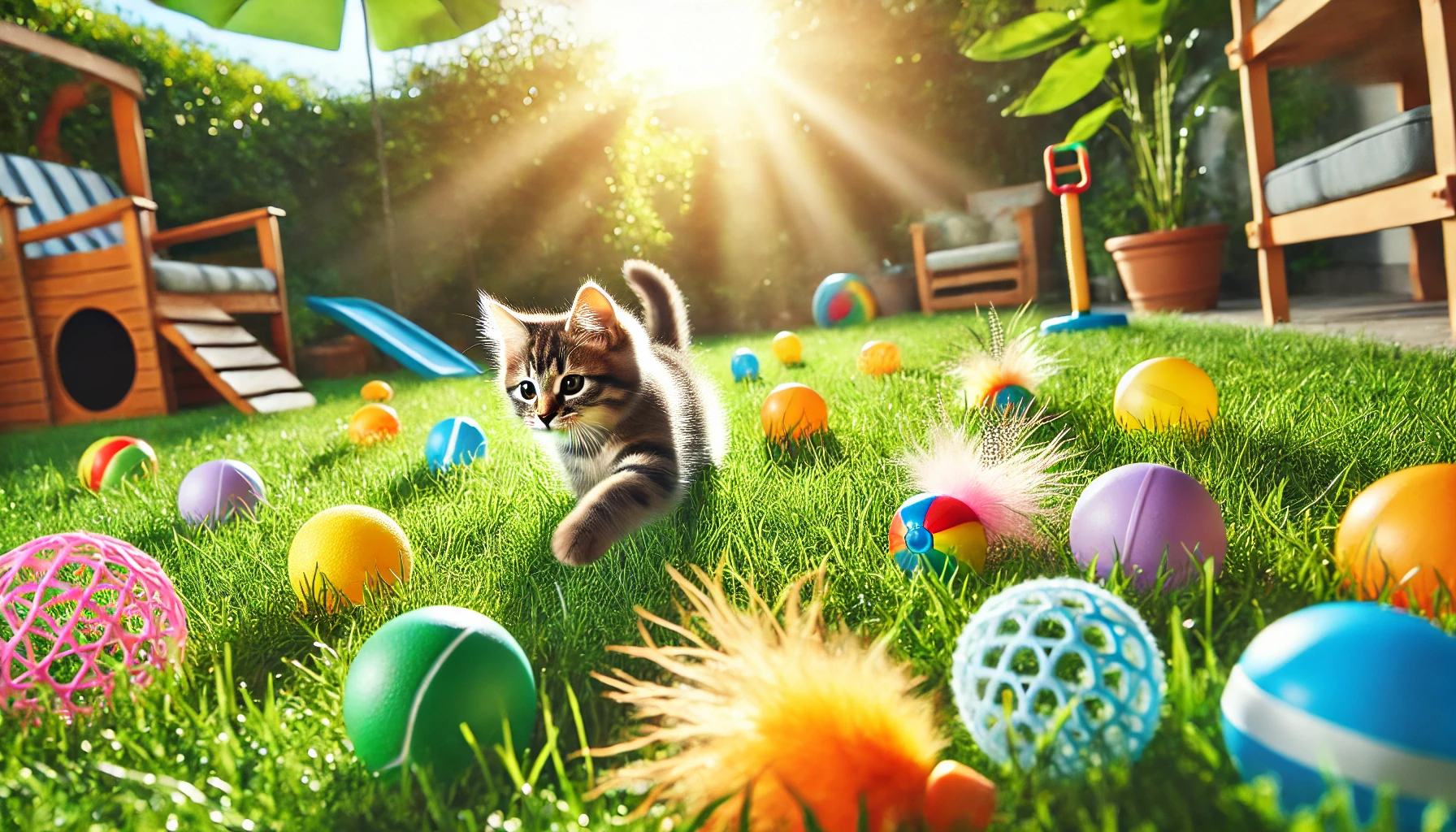
Lightweight Balls and Outdoor-Friendly Toys
For indoor and supervised outdoor play in spring and summer, lightweight balls made of soft materials are great.
These balls are easily batted around, and they often roll in unexpected ways, keeping your cat intrigued.
Cats love chasing rolling objects, especially those designed to mimic the quick movements of small prey.
Some balls come with little bells or rattles inside for added auditory enjoyment.
These toys can also refresh your cat’s summer activities if they are curious about water.
- Outdoor-safe balls: These balls are robust enough for supervised outdoor play and are designed for rough interaction.
- Water play balls: For cats that love water, batting around lightweight, water-safe balls on a shallow surface is a fun and appealing activity.
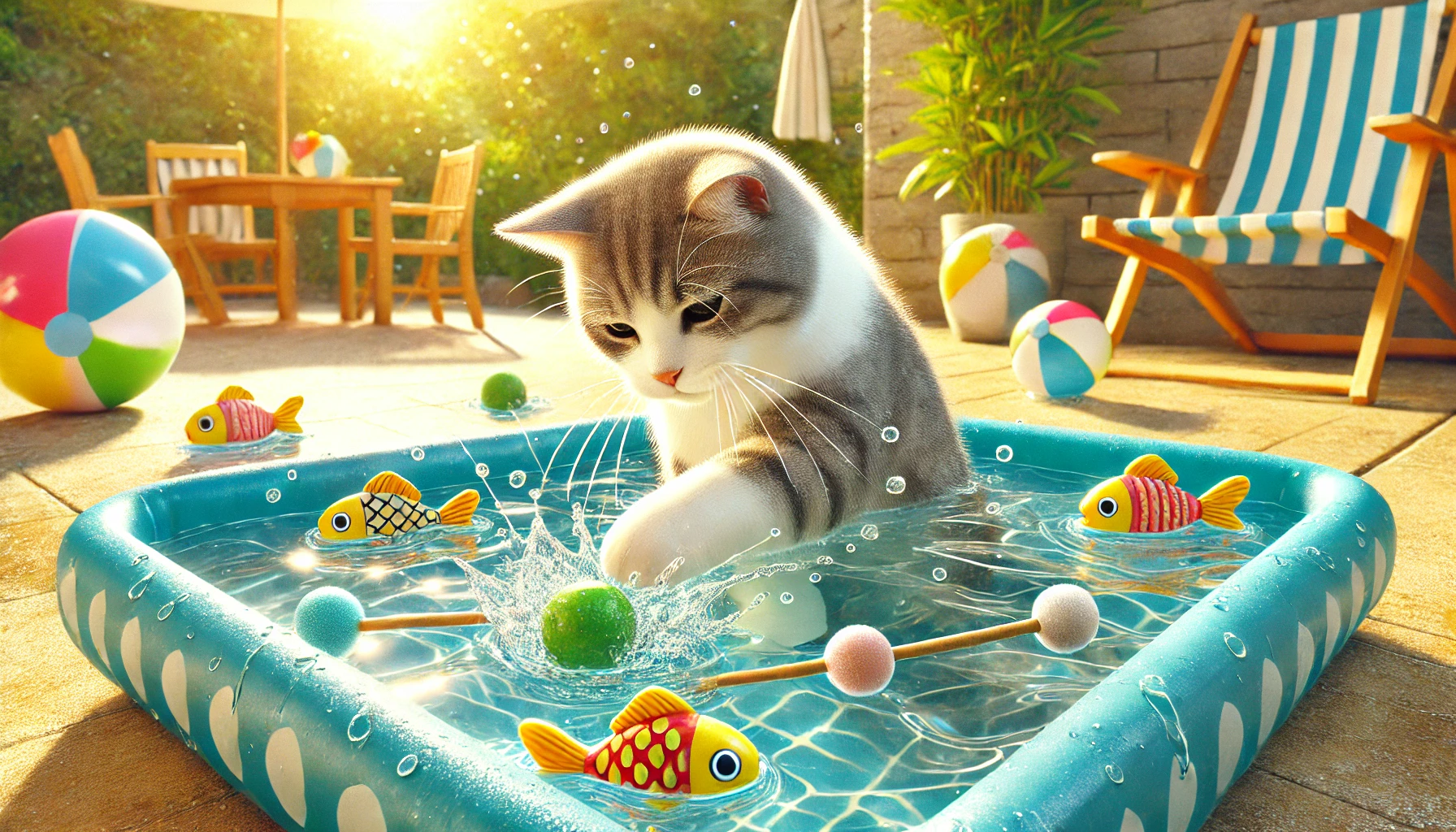
Water-Based Play for Hot Days
If your cat likes water, summer is the perfect time to explore water-based seasonal toys.
Shallow pools or water fountains with floating toys can keep your cat entertained for hours while helping them cool down.
Floating fish toys or other small objects can be batted around, and some of these toys even come with built-in treats to entice your cat.
Another option is using cat-friendly water fountains, which provide hydration and play on hot days.
- Floating fish toys: These toys float on the water surface and move unpredictably, making them ideal for inquisitive cats.
- Cat-friendly fountains: Combine hydration with play using a cat-safe fountain that invites pawing and splashing.
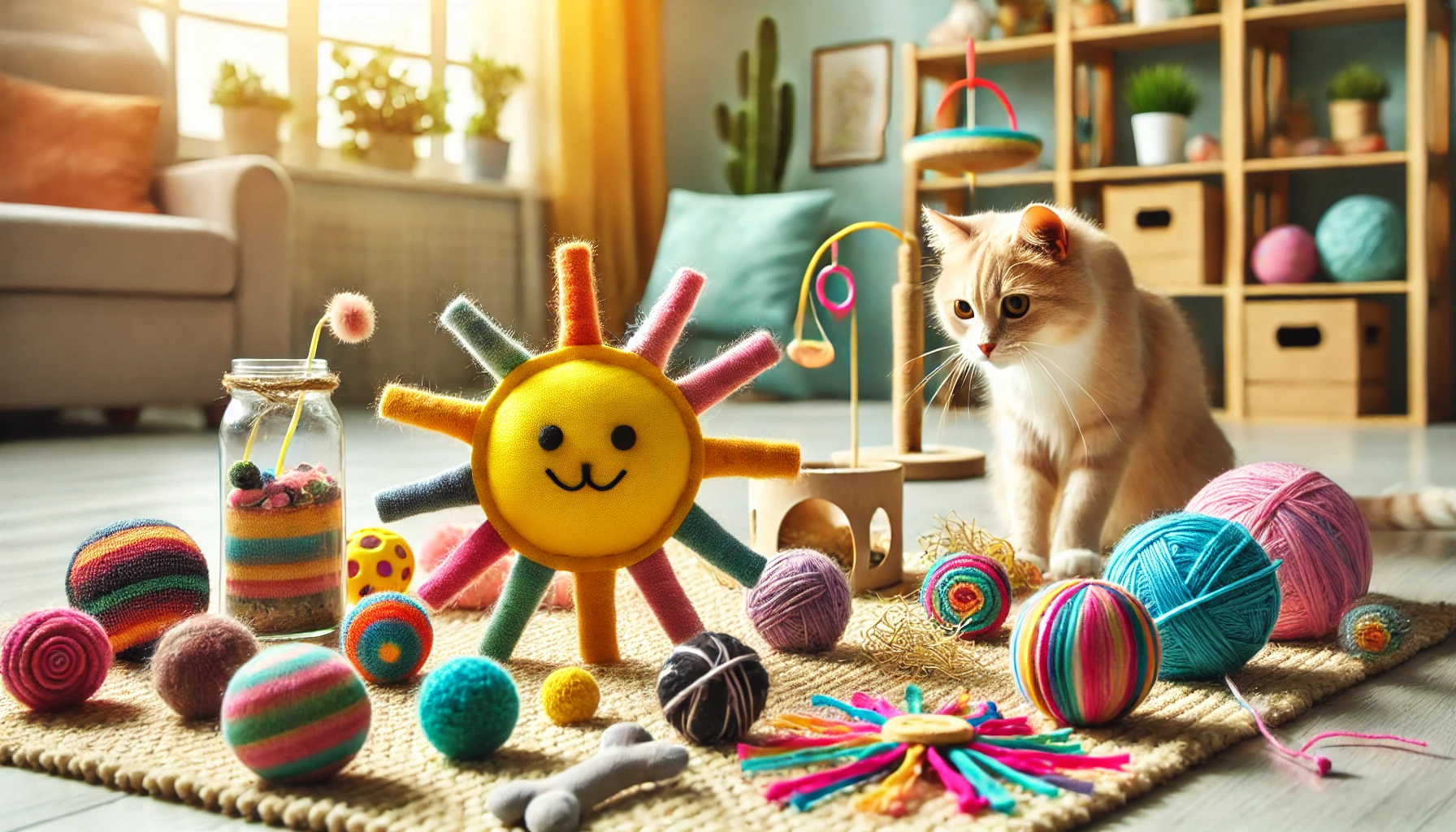
DIY Summer-Themed Toys
If you’re on a tight budget, you can easily make seasonal toys yourself at home.
DIY toys can be crafted from common materials like yarn, fabric, or even an old sock.
Your cat will love summer-themed toys, such as a catnip-filled sun or a small ball made from felt fabric.
Adding catnip or treats to homemade toys makes them even more appealing.
The beauty of DIY summer toys lies in their customization to your cat’s preferences, and they’re affordable too.
- DIY tip: Always use non-toxic materials when crafting toys for your cat to ensure their safety.
- Customization: Tailor your DIY toys to your cat’s likes, whether it’s catnip-filled, feathery, or something else that keeps them engaged.
Spring and summer toys offer exciting opportunities for outdoor-similar play indoors, helping keep your cat active during warmer months.
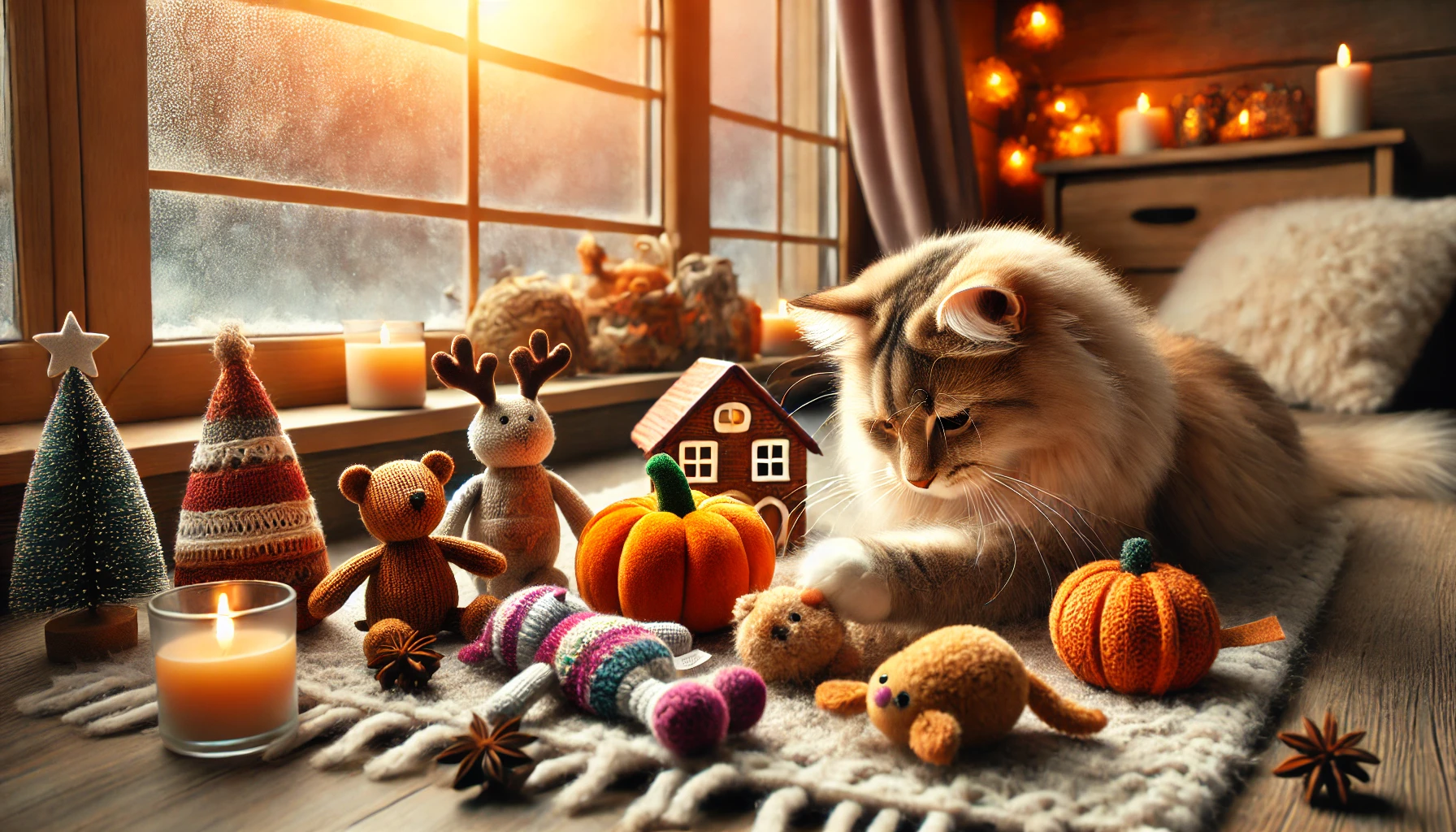
Engaging Cats with Fall and Winter Toys
As the temperature cools and the days get shorter, your cat’s play patterns may change as well.
Seasonal toys for fall and winter are designed to entertain your cat indoors when outdoor activity is less likely.
These toys provide comfort, warmth, and mental stimulation, helping your cat stay active and amused during the cold months.
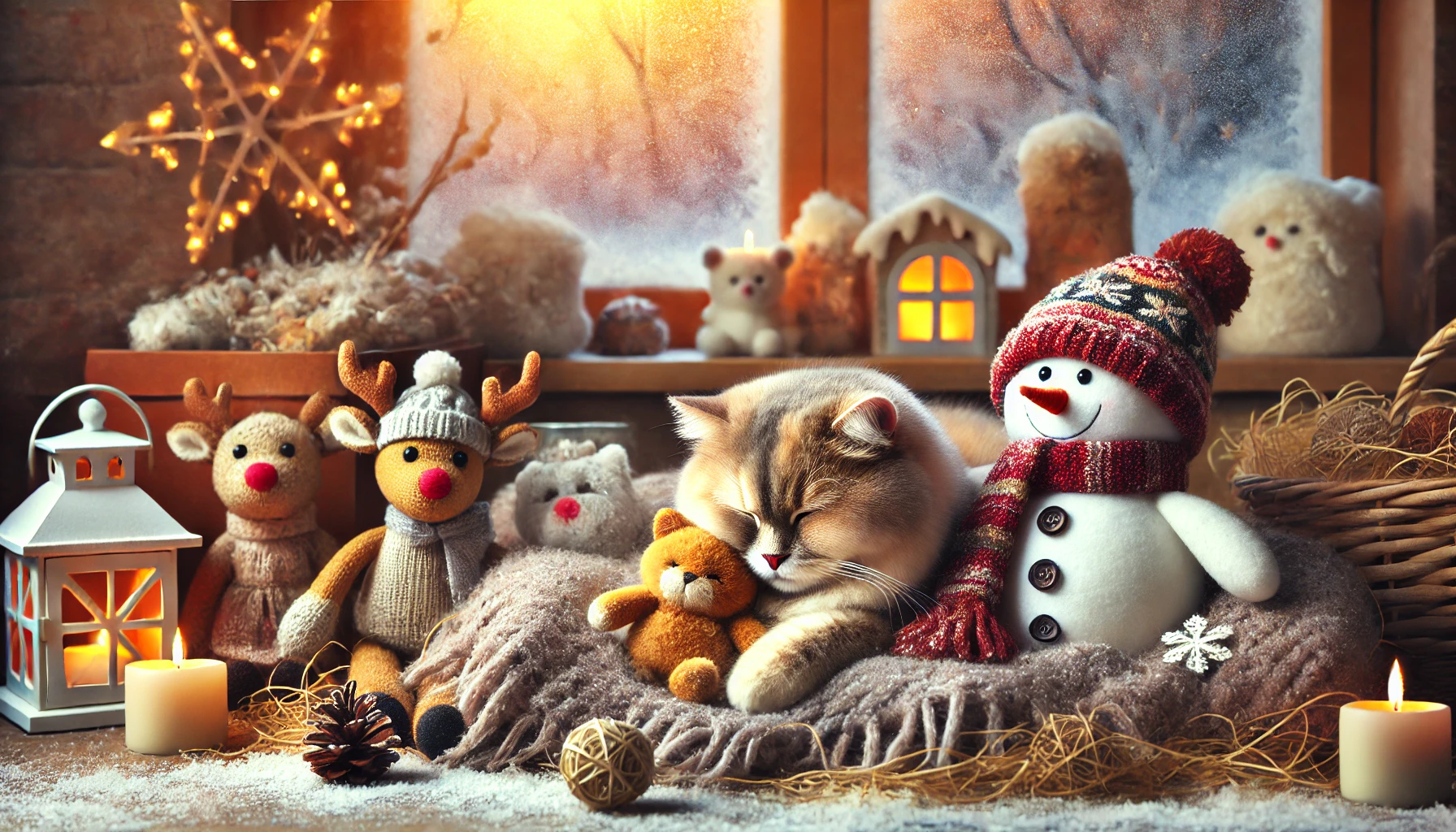
Plush and Cuddly Toys for Colder Months
Cats love warmth when the temperature drops.
Plush toys are ideal for autumn and winter because they offer warmth, comfort, and something to snuggle and play with.
Many of these plush toys contain catnip inside, making them even more appealing to your feline.
These toys can be as simple as soft balls or shaped like other stuffed animals—keeping your cat both mentally and physically engaged indoors.
- Cozy plush toys: Choose soft toys filled with catnip to enhance both sleep and play.
- Interactive plush toys: Consider plush toys with noise or different textures to keep your cat interested for longer periods.
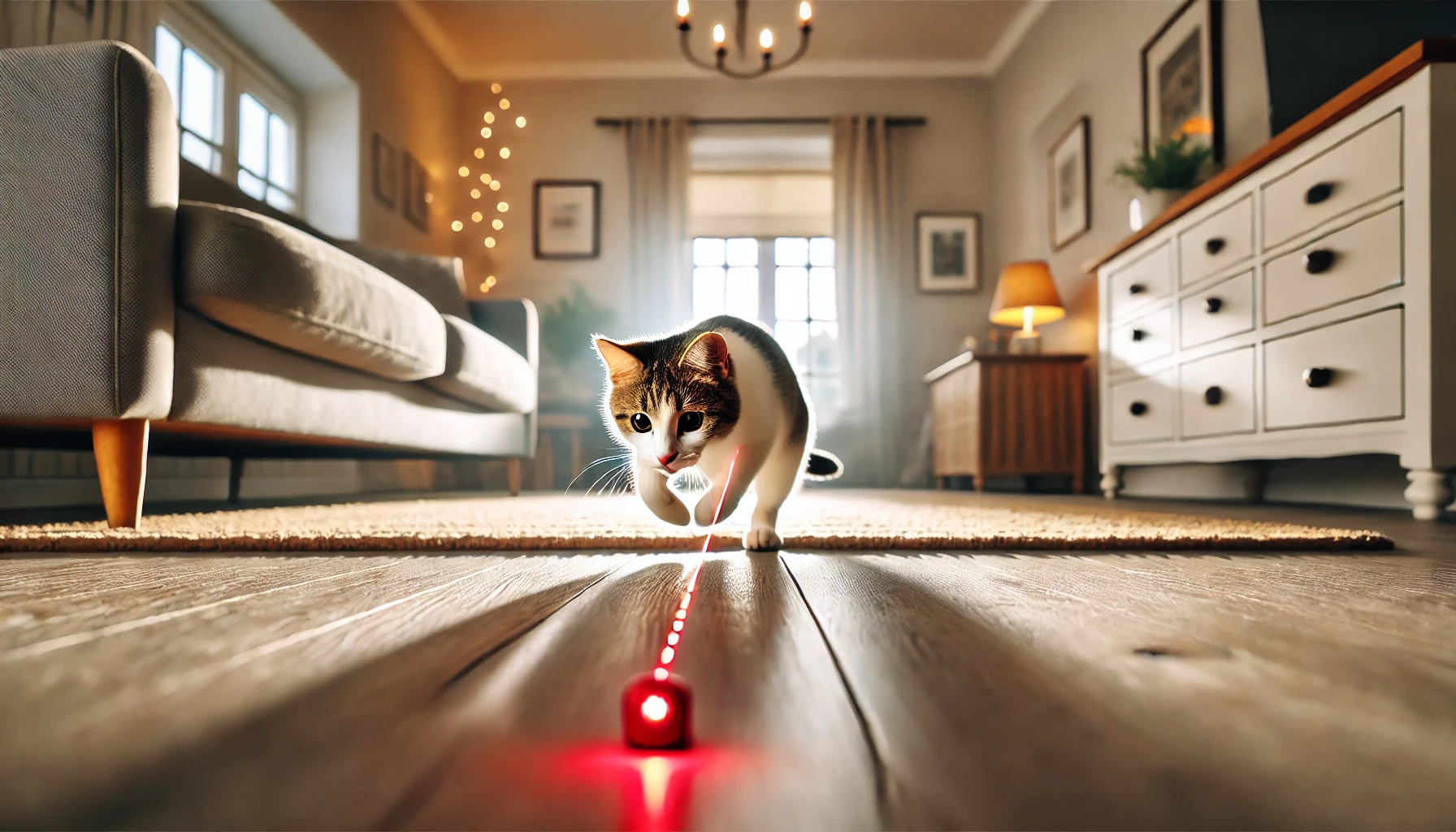
Interactive Laser Pointers for Indoor Fun
During colder months, when indoor time increases, laser pointers are a great way to keep your cat active.
Laser toys stimulate your cat’s hunting instincts, even when outdoor play isn’t possible.
The quick, nimble red dot appeals to your cat’s desire to chase, pounce, and jump, allowing them to burn off energy in a fun, challenging way.
Some laser pointers have automatic features, enabling hands-free play—perfect for busy pet owners.
- Laser pointers: Use these to challenge your cat’s agility and reflexes, providing hours of fun indoors.
- Automatic laser toys: These can be set to move around unpredictably, keeping your cat busy without needing constant supervision.
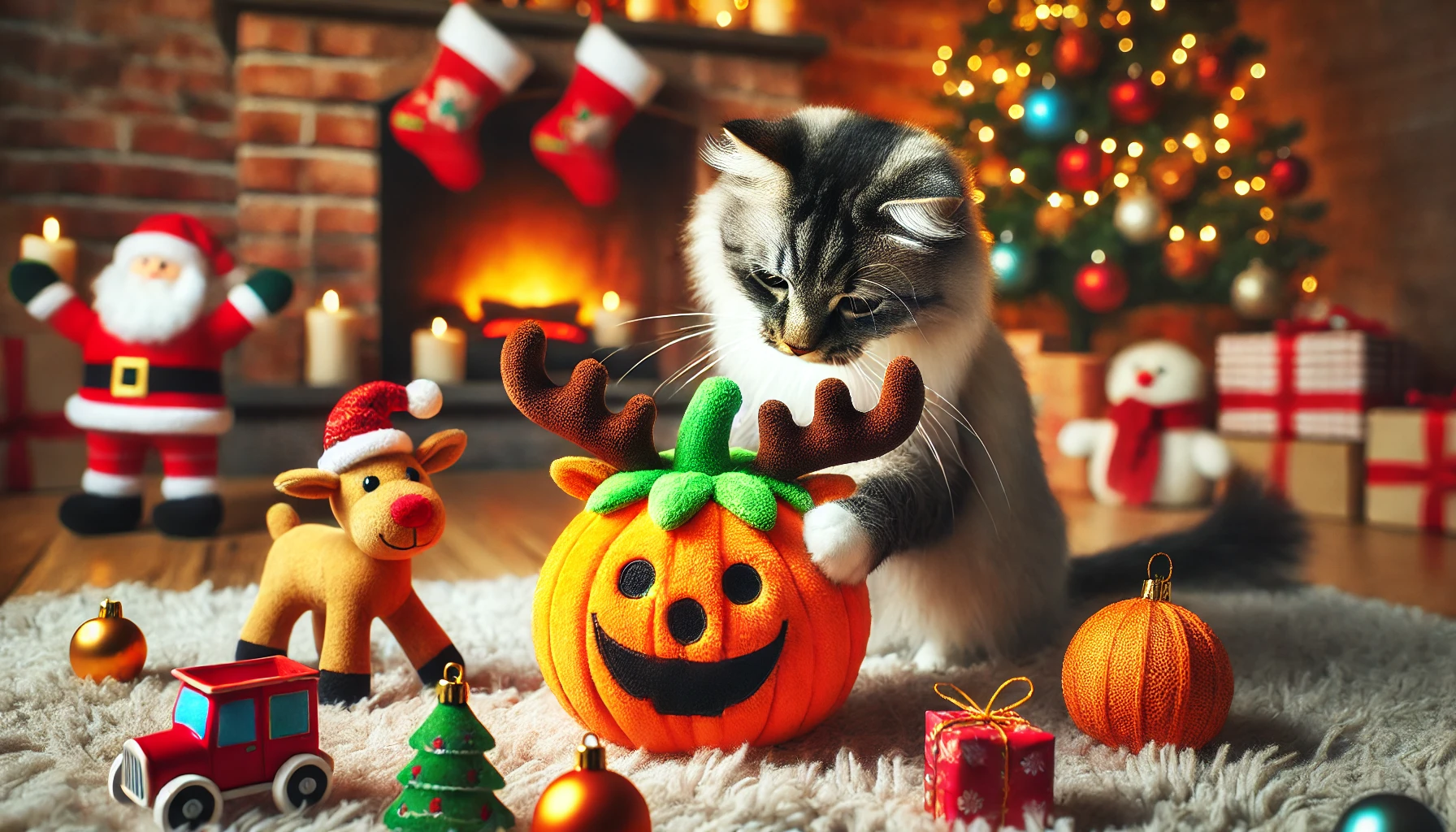
Holiday-Themed Toys
The holiday season brings festive cheer, and your cat can join in the fun!
Holiday-themed toys, such as pumpkin-shaped toys for Halloween or stocking-shaped toys for Christmas, can make the colder months more enjoyable for your cat.
Many of these toys come in bright seasonal colors and are filled with catnip or other enticing textures, keeping your feline entertained when the household is busy with seasonal activities.
- Halloween toys: Look for pumpkin-shaped or ghost-themed toys to match the fall holiday spirit.
- Christmas toys: Stocking-shaped, Santa hat-shaped, or reindeer-themed toys, many of which contain catnip for added fun.
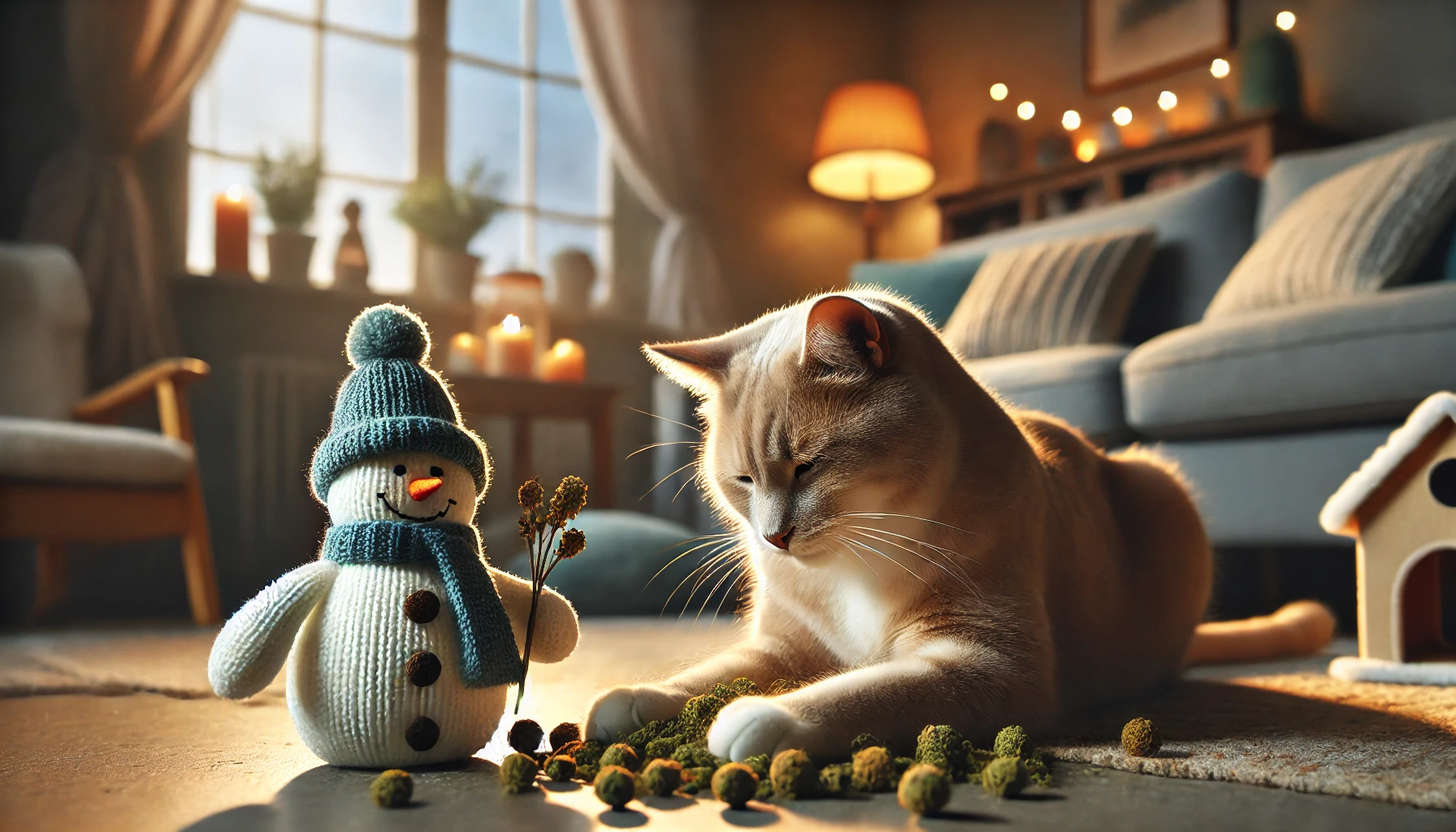
Catnip-Infused Toys for Winter Calm
Catnip toys are extremely popular during the colder months, providing excitement and relaxation for your cat while they stay indoors.
Catnip has a calming effect, making it a great way to entertain your cat while helping them unwind during the holiday season.
Whether it’s plush toys, balls, or even scratchers filled with catnip, these toys can keep your cat entertained for hours when outdoor activities are limited.
Remember to rotate your catnip toys regularly to maintain your cat’s interest.
- Catnip-filled toys: Use these toys during quiet winter evenings to help your cat relax while keeping their senses engaged.
- Rotating toys: Regularly switch out toys to prevent your cat from becoming bored with one particular toy.
Fall and winter toys provide comfort and warmth, keeping your cat entertained indoors during colder months.
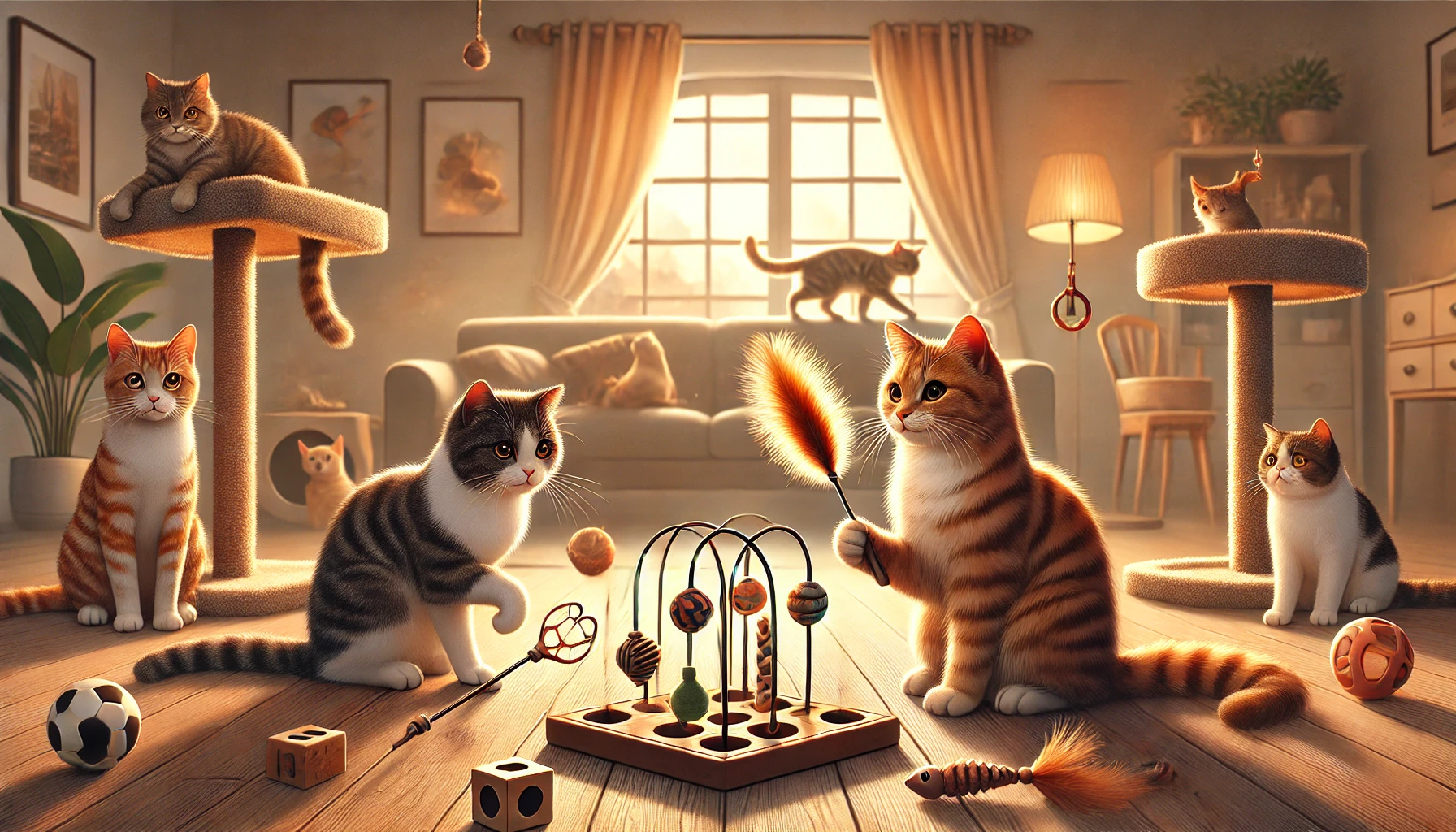
Choosing the Correct Seasonal Toys According to Your Cat’s Personality
Not all cats are alike, especially at playtime.
Every cat has its own personality, which means their preference for seasonal toys can vary widely.
Understanding your cat’s play style, energy level, and whether they prefer staying indoors or outdoors will help you pick out the correct toys that will keep them entertained and happy throughout the year.
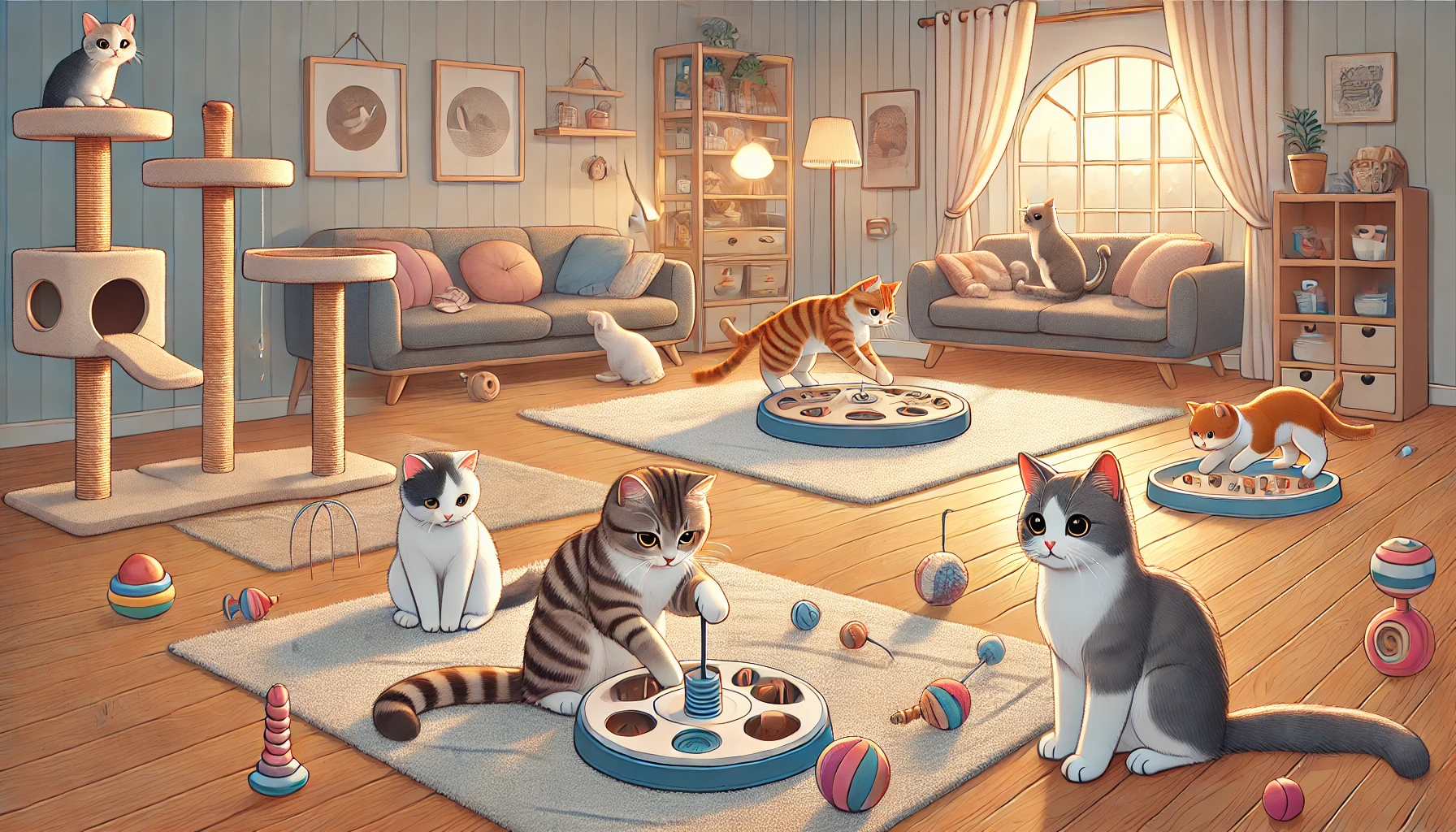
Play Style Considerations
Some cats are natural hunters, while others may enjoy more laid-back play.
By observing how your cat interacts with different toys, you can identify their style.
If your cat enjoys chasing fast-moving objects, they will love laser pointers or lightweight balls.
On the other hand, if they prefer slow, calculated movements, plush toys or puzzle feeders may be more stimulating.
Try to match the toy with your cat’s instinctive play style to maximize their engagement.
- For active hunters: Choose toys that mimic small prey, like feather wands, mouse-shaped toys, or objects that move erratically.
- For calm players: Opt for comforting and mentally stimulating toys, like plush toys or interactive puzzles.
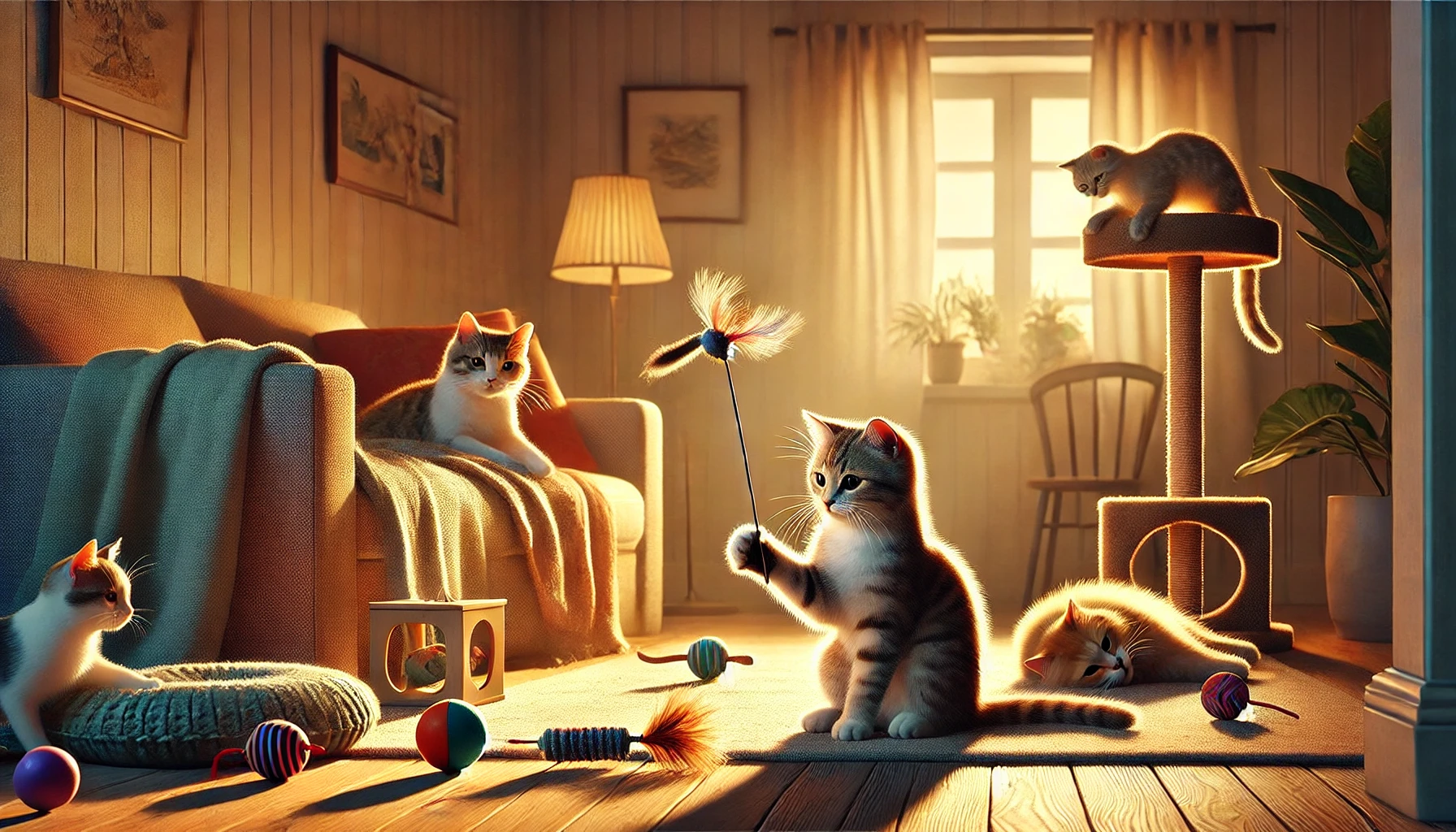
Age and Energy Levels
Your cat’s age is also an important factor when selecting seasonal toys.
Kittens or younger cats tend to have more energy and will love fast-paced, high-energy toys that challenge their agility and coordination.
Older cats may prefer low-key toys that require less physical effort but still engage the mind.
Consider your cat’s energy levels when choosing toys, and remember that their energy may fluctuate with the seasons.
- For kittens and young cats: High-energy toys, such as feather teasers or balls, will keep them running and help develop their coordination skills.
- For senior cats: Gentle toys, like slow-moving plush toys or catnip-filled items, will encourage relaxation and gentle play.

Indoor vs. Outdoor Cats
Whether your cat is an indoor or outdoor cat can make a difference in which seasonal toys best suit them.
Indoor cats, for example, may need more mental stimulation and physical exercise since they don’t have the opportunity to explore the outdoors.
Toys like laser pointers or interactive food puzzles that mimic hunting can provide them with much-needed activity.
Outdoor cats, on the other hand, may appreciate more durable toys suitable for outdoor play, such as heavy-duty balls or toys designed for chasing in the yard.
- For indoor cats: Stimulate your indoor cat’s mind with toys that mimic hunting, such as treat-dispensing toys and interactive wands.
- For outdoor cats: Choose durable toys designed for rough play, such as rubber balls or outdoor-safe feather toys.
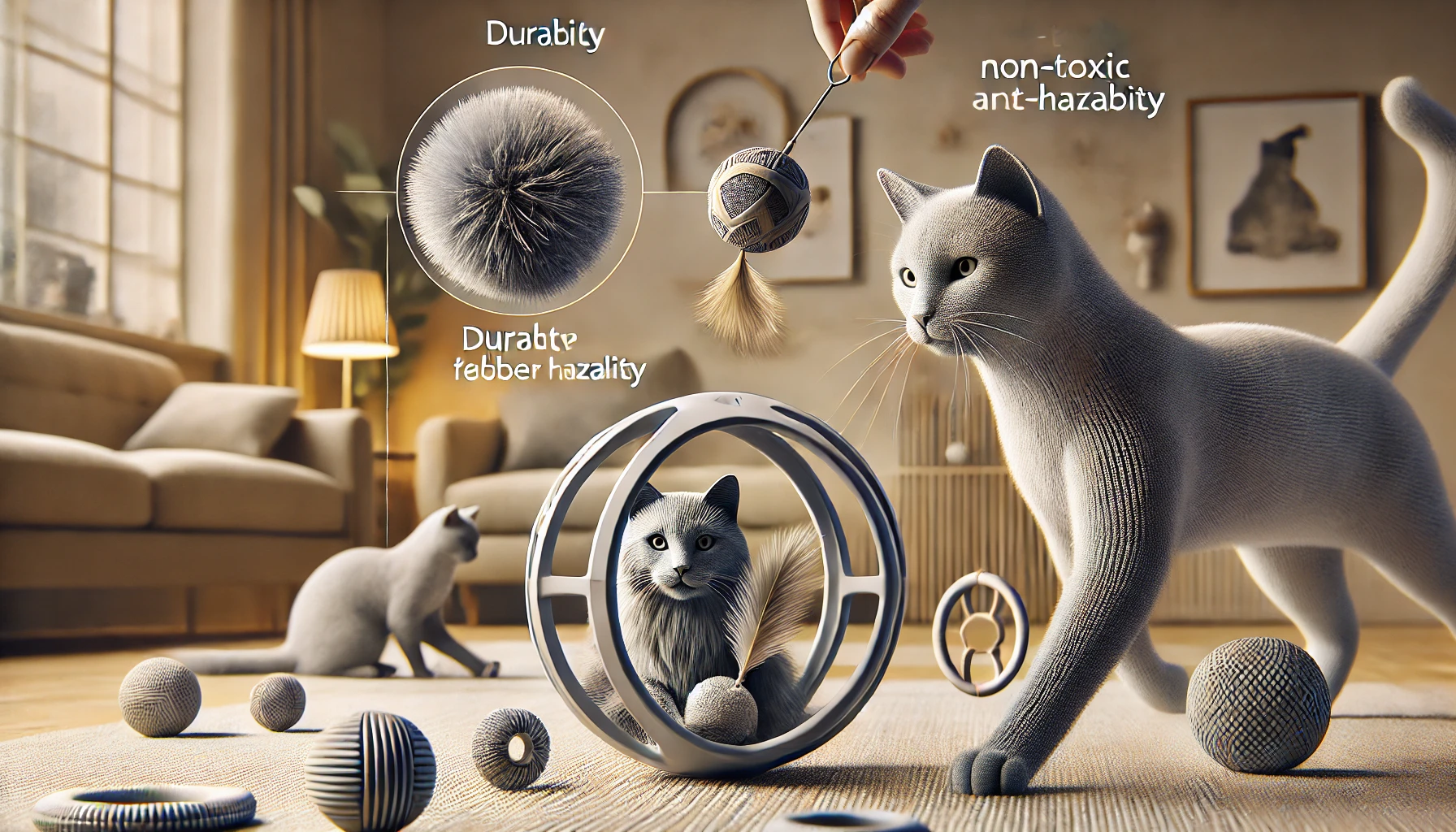
Safety and Durability
When selecting seasonal toys, it’s important to consider safety and durability, especially if your cat is a rough player.
Toys made from non-toxic, durable materials will keep your cat safe during playtime.
Ensure that the toys you purchase do not contain small parts that could pose a choking hazard, such as sharp edges or strings.
Durable toys also ensure that your cat can enjoy them for multiple seasons without excessive wear and tear.
- For rough players: Choose toys made from strong materials, such as rubber or tough fabric, that can withstand aggressive play.
- For gentle players: Softer toys with plush textures or catnip fillings are ideal for less aggressive cats.
Each cat has a unique play style, and choosing toys that match their personality can enhance their engagement and happiness year-round.
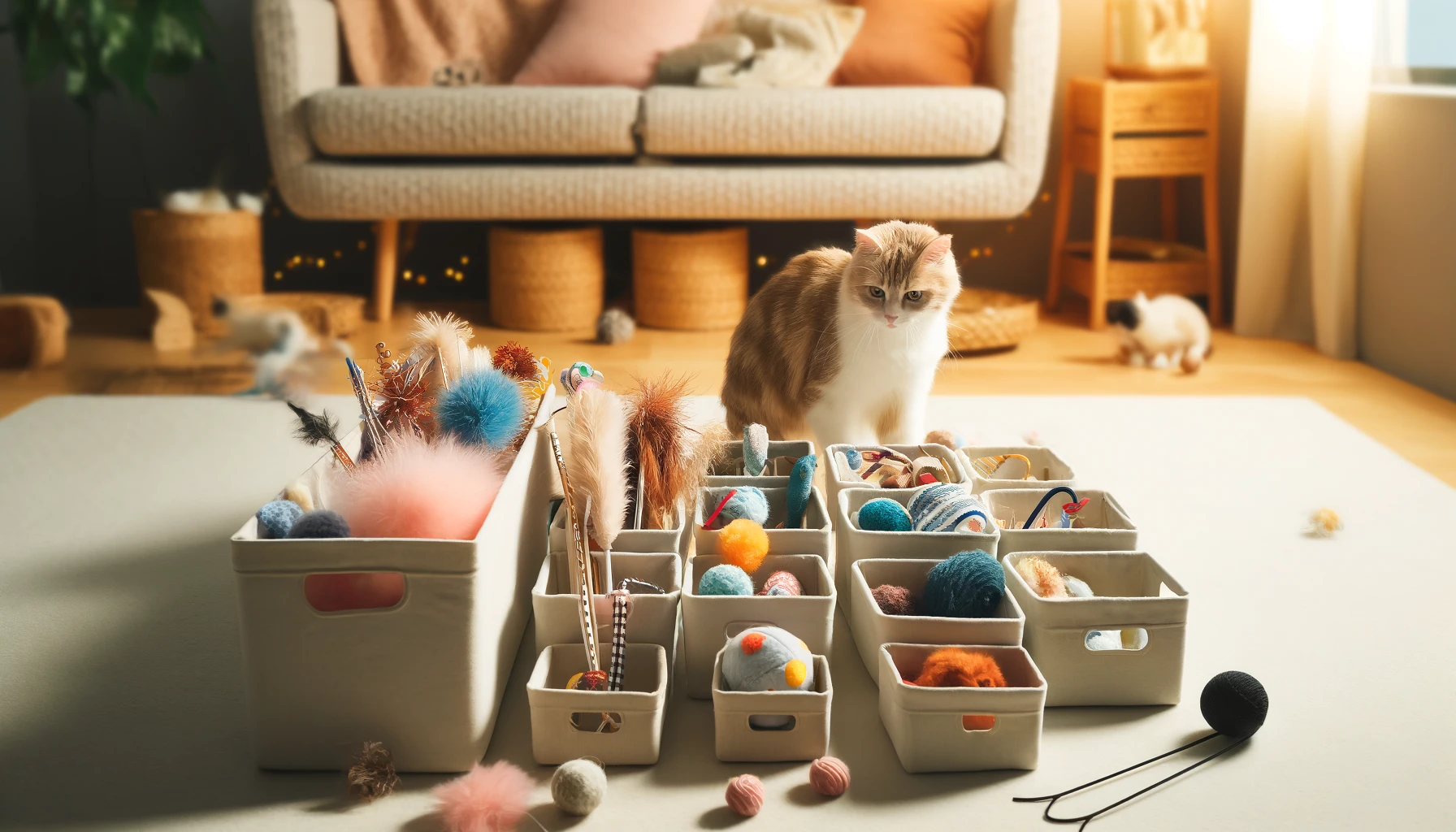
How to Rotate Seasonal Toys for Maximum Engagement
Just like humans, cats get tired of the same toy over and over again.
If your cat has seasonal toys, rotating them will keep your cat interested and excited during playtime.
Rotation not only keeps the toys fresh and interesting but also stimulates your cat’s mind by presenting new challenges.
Here’s how you can take care of your cat’s toy rotation to ensure they never get bored.
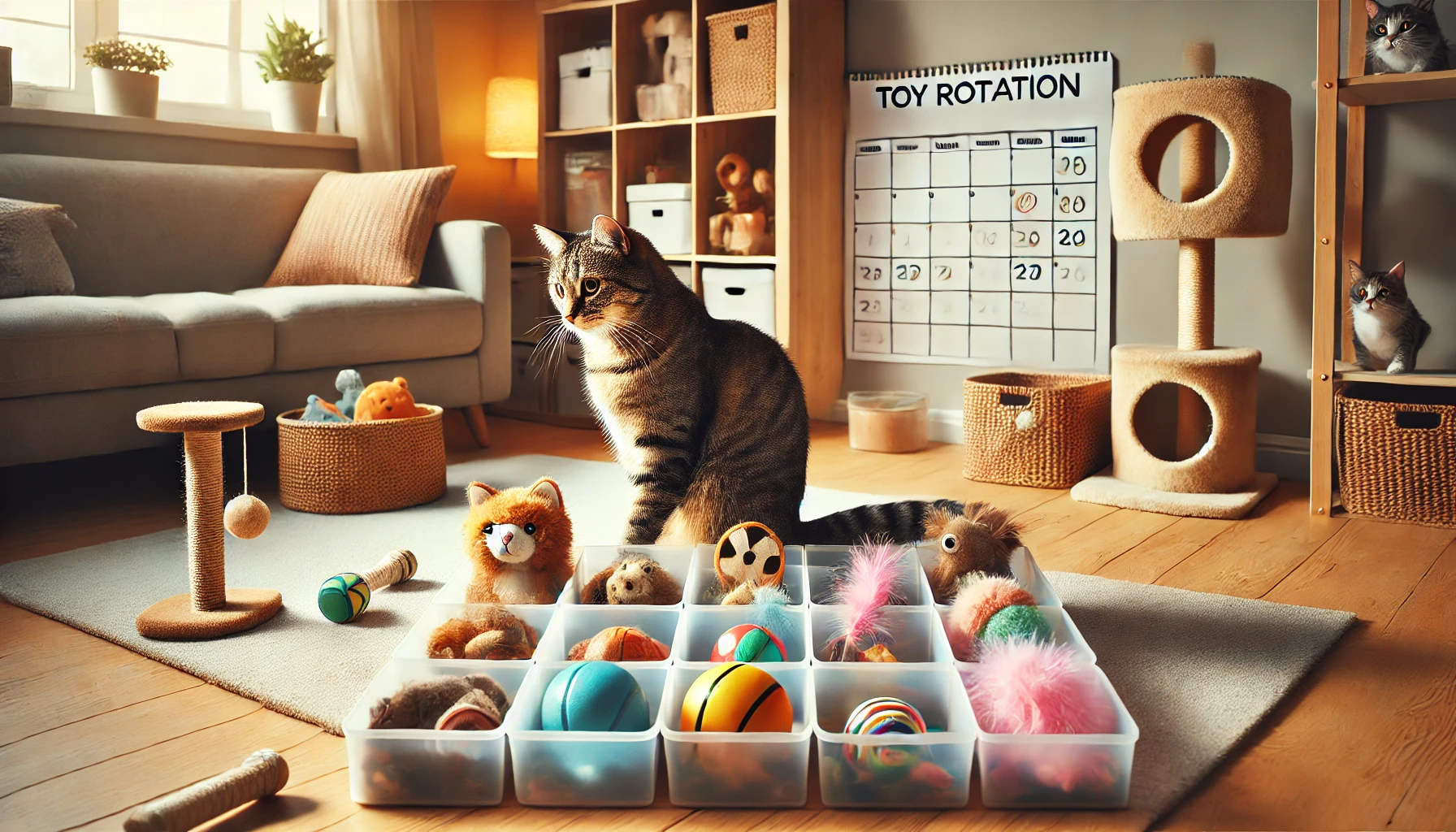
Scheduling Toy Rotation
The key to keeping your cat engaged with their toys is to establish a toy rotation schedule.
Instead of having all toys available at once, offer a few toys at a time and rotate them every couple of days or on a weekly basis.
This way, even if your cat has used the toys before, they will still feel fresh and exciting.
Seasonal toy rotation is particularly effective, as your cat may find certain toys more appealing at different times of the year.
- Weekly rotation: Change toys weekly to maintain novelty and keep your cat’s interest.
- Seasonal rotation: Rotate toys with the seasons—lightweight toys for summer and plush, warm toys for winter.
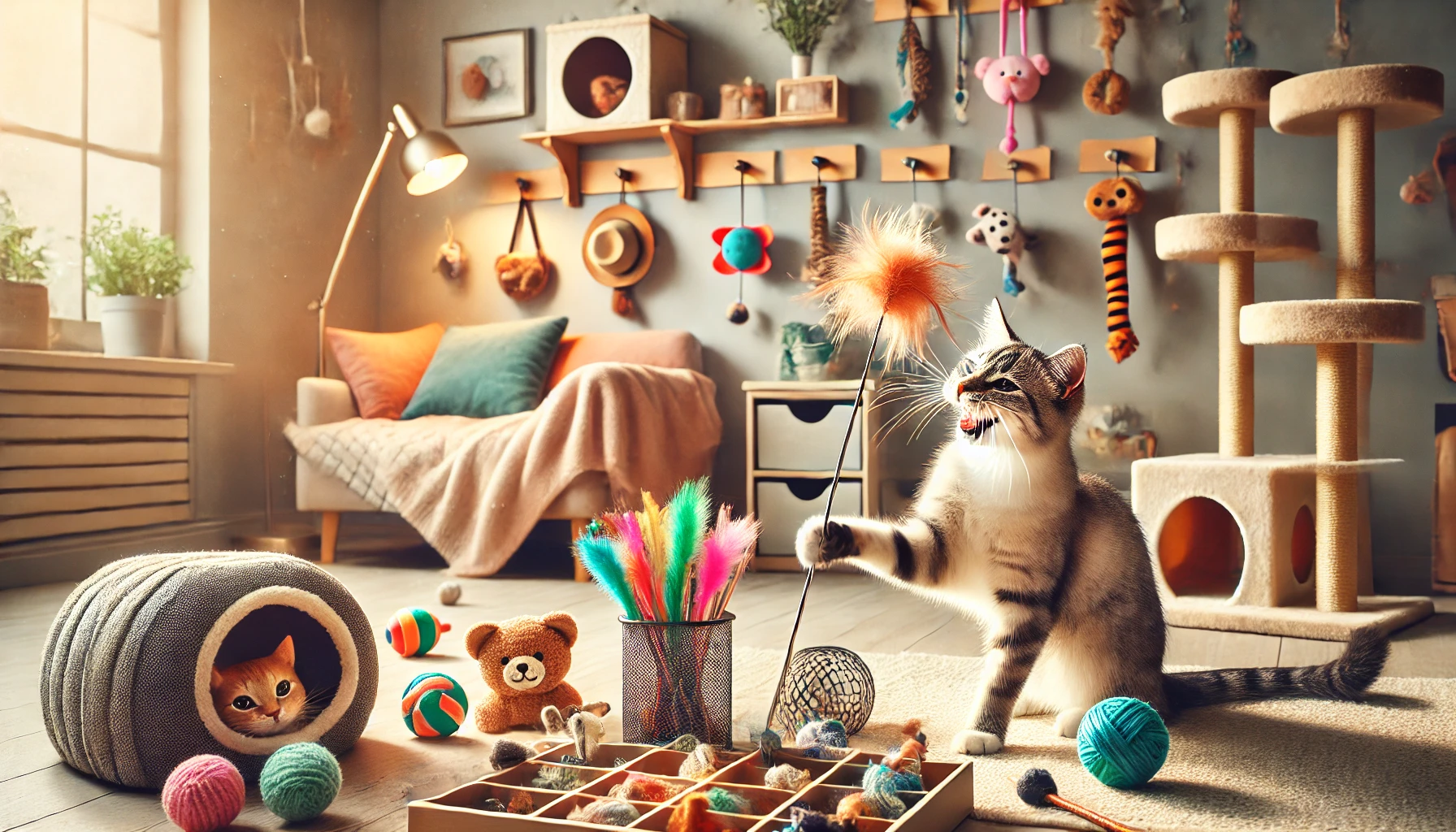
Keeping Toys Fresh and Exciting
To keep your cat engaged with their seasonal toys, it’s important to keep them fresh.
One effective way to do this is by sprinkling a bit of catnip on the toys before reintroducing them.
This can reignite your cat’s interest.
You can also move toys around your home to create a sense of discovery for your cat.
Sometimes, hiding a toy in a new location is all it takes to encourage your cat to explore and play for hours.
- Refresh with catnip: Sprinkle catnip on old toys to reignite your cat’s interest.
- Rotate locations: Relocate toys to different areas in your home to encourage exploration and play.
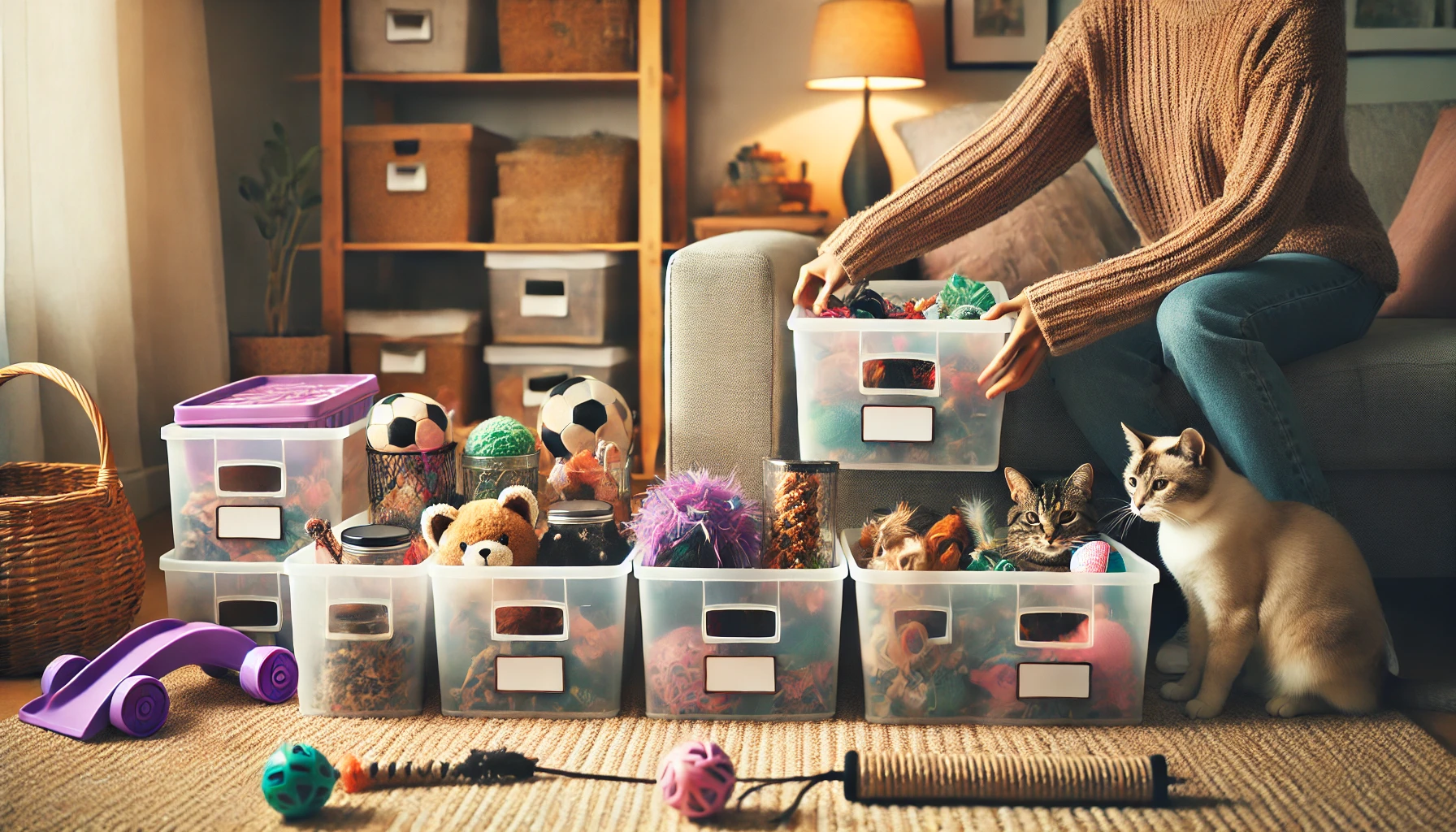
Storage Tips for Off-Season Toys
It’s important to store your cat’s off-season toys properly to ensure they are in good condition when needed again.
Store them in a cool, dry place, and if they contain catnip, seal them in an airtight container to preserve freshness.
Organizing toys by season can also make it easier to know where to find the appropriate toys when the time comes to rotate them back into play.
- Store in a cool, dry place: This prevents toys from deteriorating when not in use.
- Use airtight containers: For catnip-filled toys, airtight containers will keep the catnip fresh until it’s time to use them again.
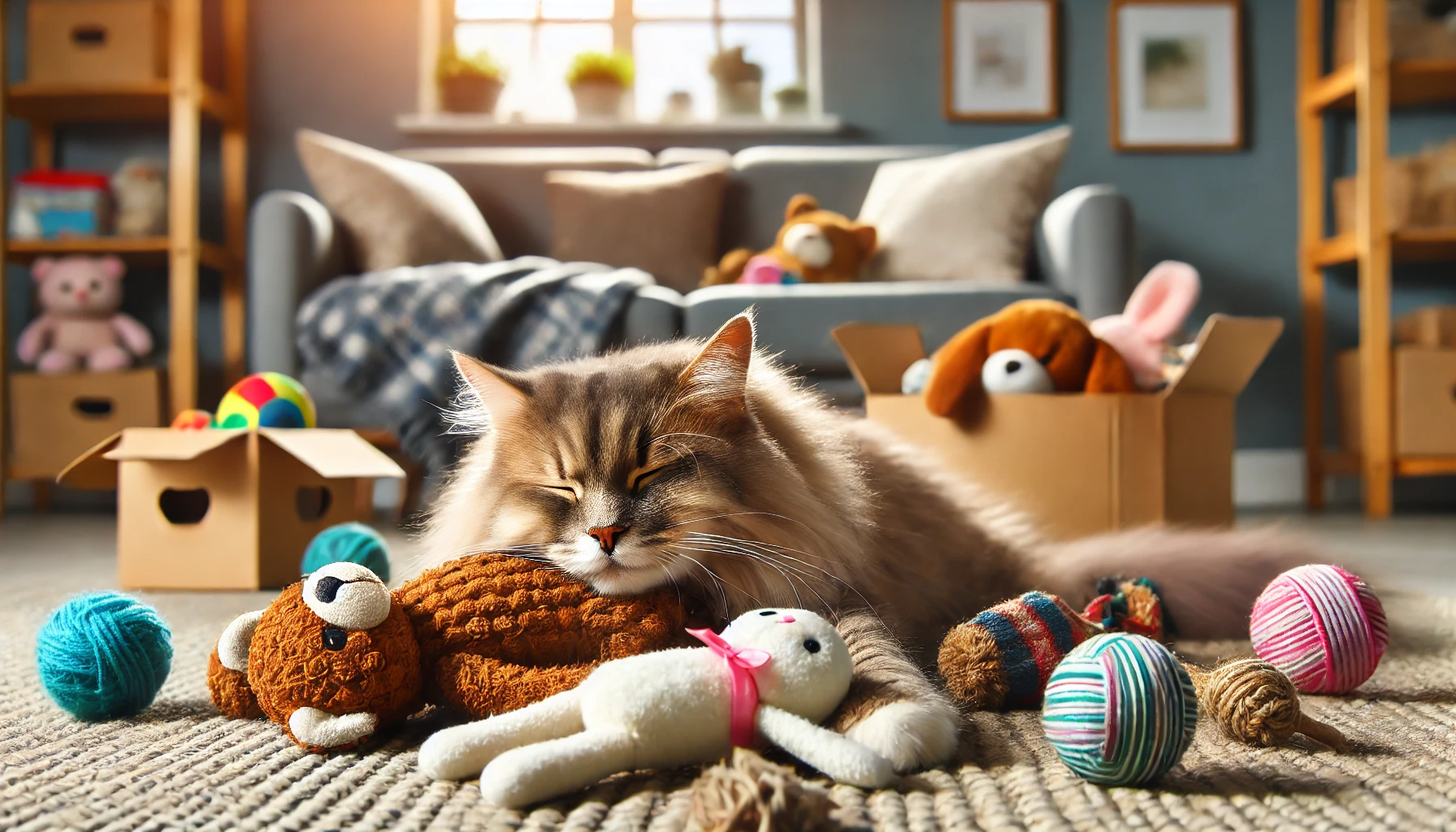
Signals That Your Cat Needs New Toys
Even with toy rotation, there will come a time when your cat’s toys need to be replaced.
Look for signs that your cat has grown bored or that the toys are damaged.
If your cat ignores the toys, plays with them less, or the toys are torn, it’s time to introduce new ones.
Regularly updating their toy collection ensures your cat remains stimulated and entertained throughout the year.
- Boredom: If your cat shows little interest in previously played toys, it’s time for a rotation or to introduce new toys.
- Damaged toys: Replace any toys that are torn or worn out to avoid potential safety hazards.
Rotating toys on a weekly or seasonal basis keeps your cat’s interest fresh and ensures continuous engagement.
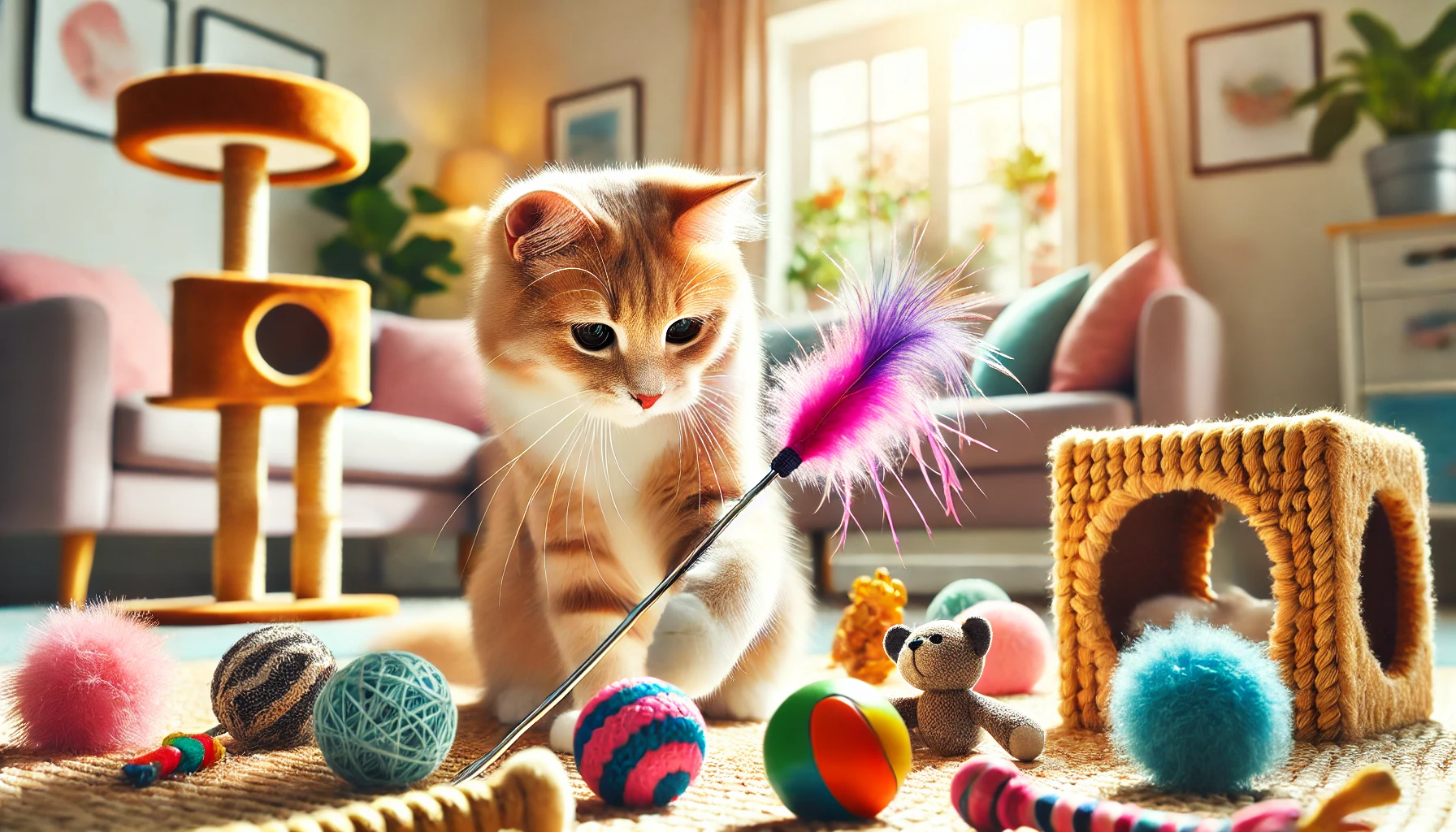
Keeping Your Cat Healthy and Happy: The Benefits of Seasonal Toys
Keeping your cat active, engaged, and mentally stimulated throughout the year can be easily achieved with the right seasonal toys.
You can make playtime rewarding for your feline friend by rotating toys, basing your selection on their personality, and choosing toys that match the seasons.
Throughout this article, we’ve explored how seasonal toys can enhance your cat’s physical and mental health, keeping them fit and entertained in every season.
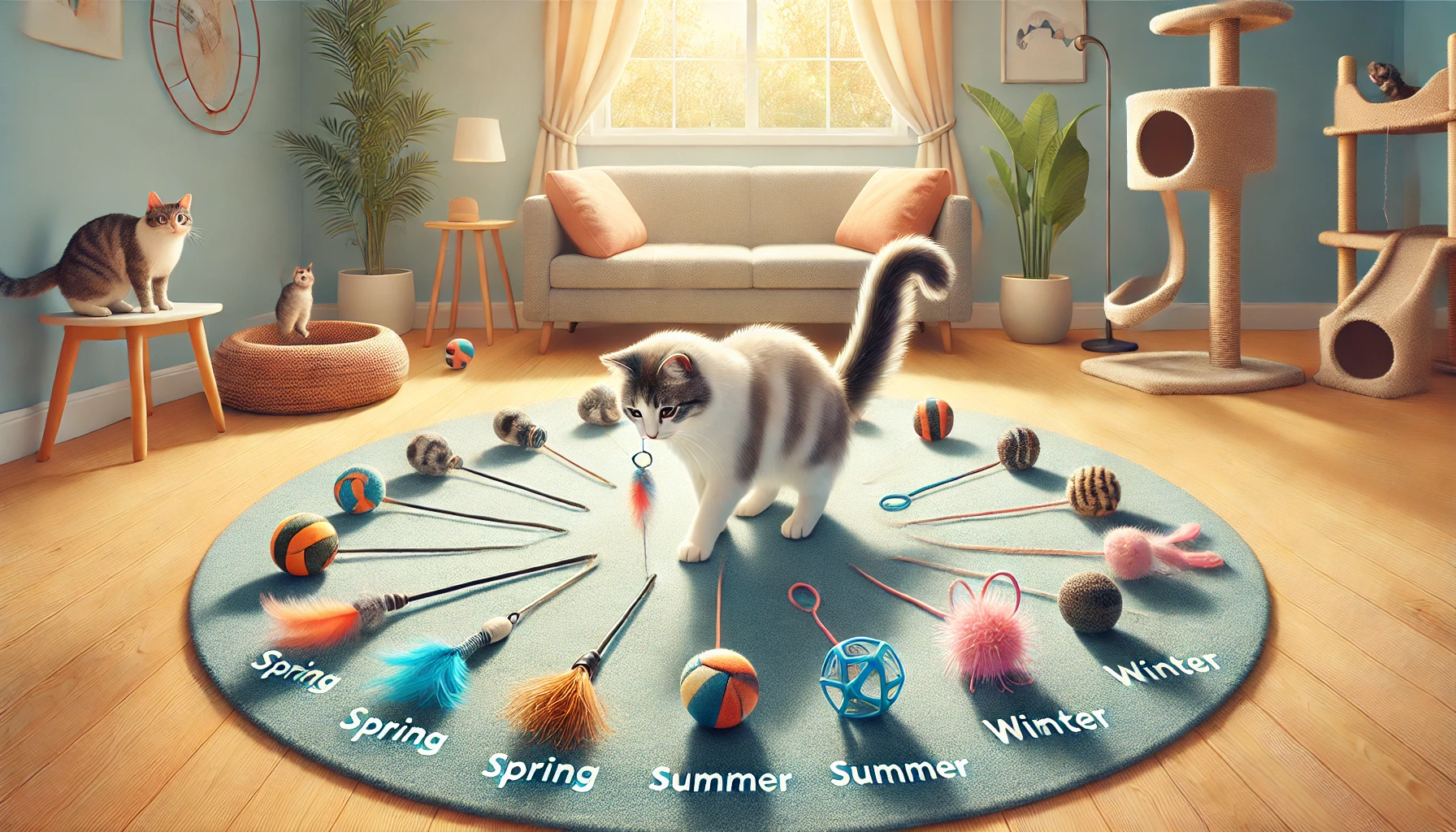
Why Seasonal Toys Matter
We’ve seen how seasonal toys are essential for refreshing your cat’s environment.
Cats love variety, and introducing new toys that align with the changing seasons helps prevent boredom while satisfying their natural instincts.
Fast-paced toys for active summer play or cozy, snuggly toys for winter offer your cat the stimulation they need based on the time of year.
Rotating these toys regularly helps avoid over-familiarity, which can lead to disinterest.
Scheduling a consistent toy rotation keeps your cat’s environment dynamic, ensuring they remain excited about playtime, which keeps both their body and mind stimulated.
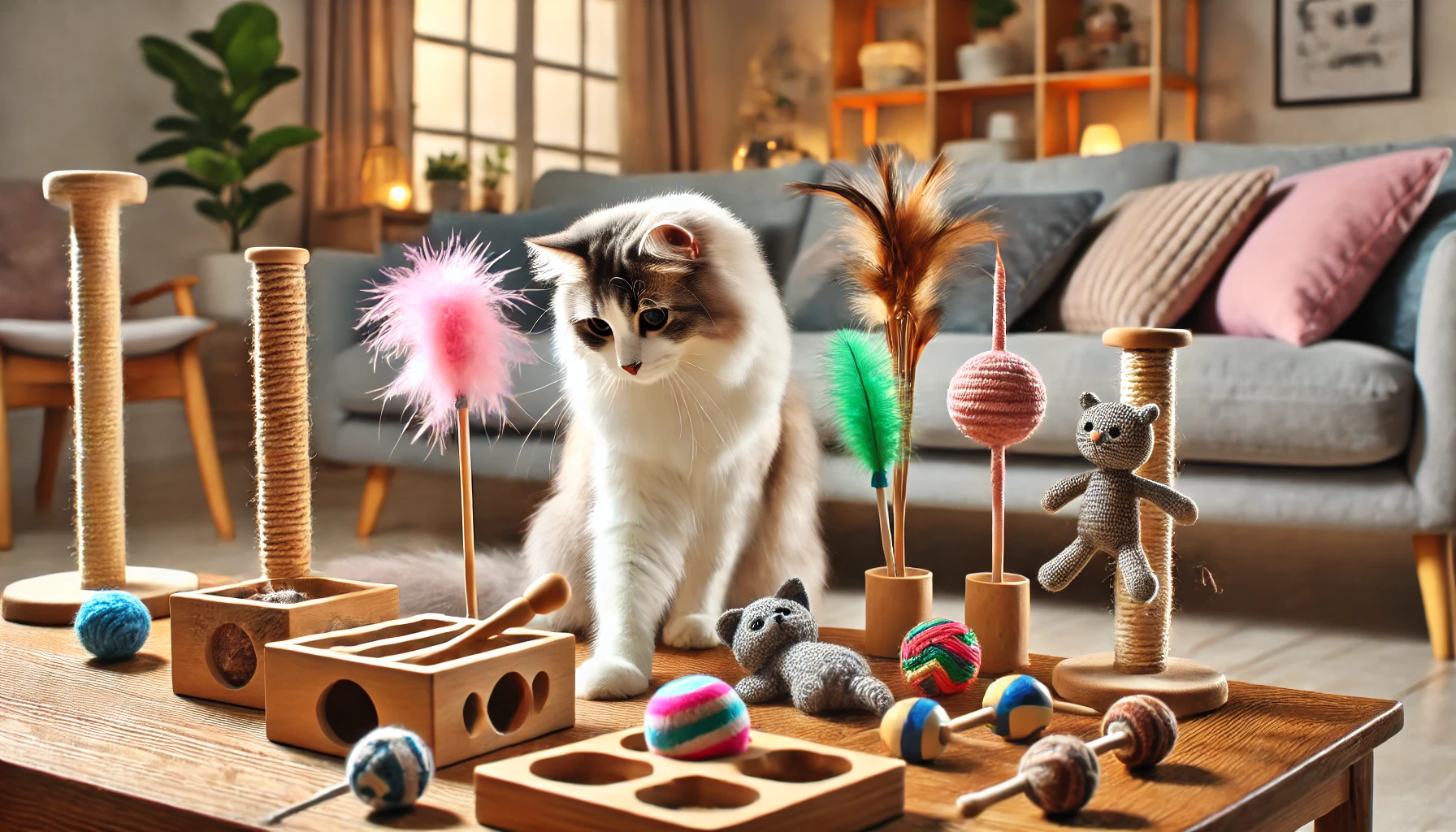
Choosing the Right Toys for Your Cat
When selecting the perfect seasonal toys for your cat, consider their unique personality, age, and whether they are indoor or outdoor cats.
Active hunters will enjoy prey-simulation toys such as feather wands or laser pointers, while more laid-back cats may prefer plush or puzzle toys for a more relaxed form of entertainment.
Senior cats benefit from toys that are stimulating yet gentle, while kittens will love fast-moving, energetic toys that encourage their playful nature.
Choosing toys based on these factors ensures your cat is fully engaged and enhances their overall happiness and well-being.
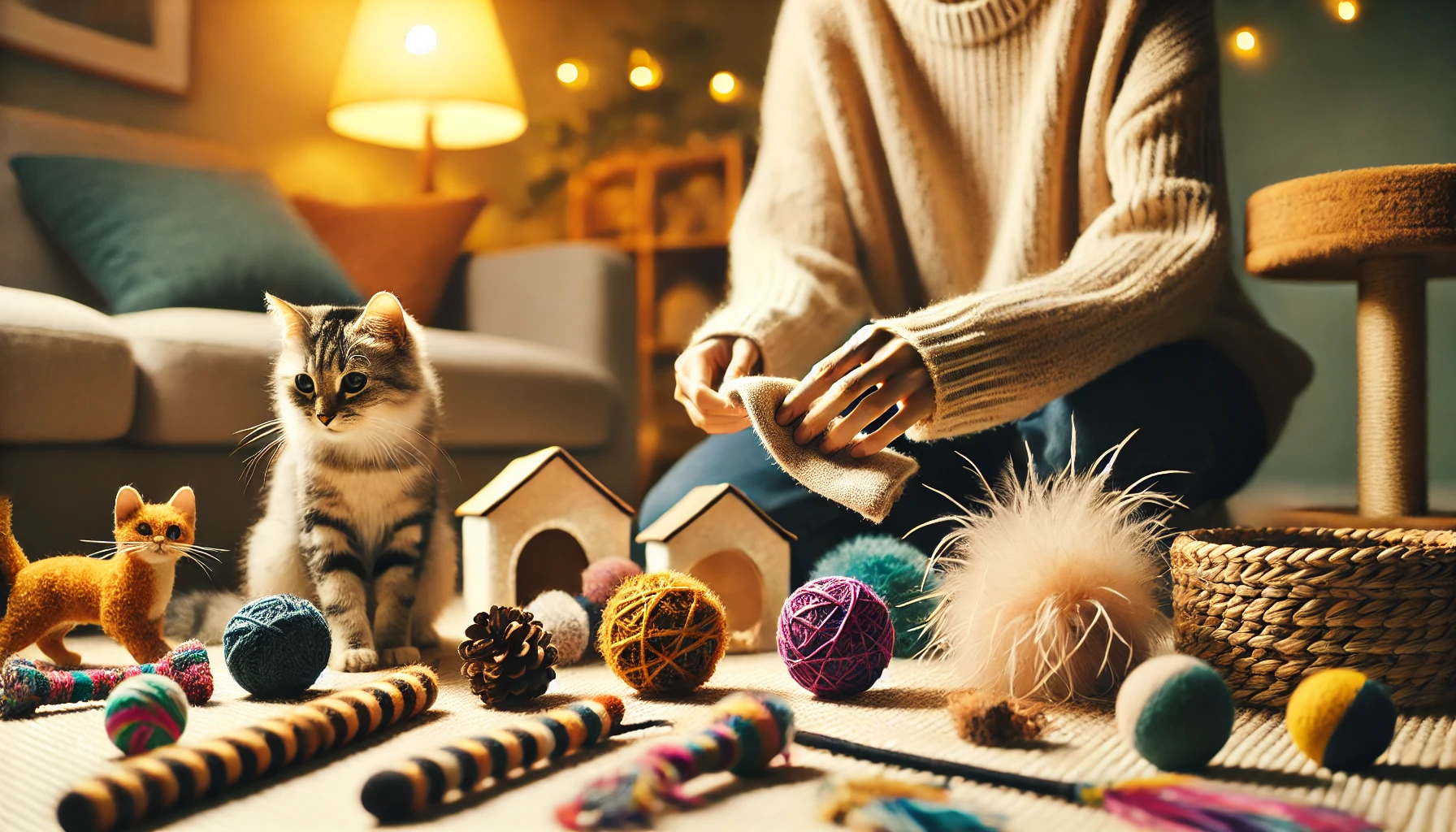
How to Maintain the Quality of Seasonal Toys
Properly storing and maintaining your cat’s seasonal toys ensures they can be enjoyed for multiple seasons.
Store off-season toys in a cool, dry place, and if the toys contain catnip, keep them in airtight containers to preserve freshness.
Be sure to replace any toys that are broken or worn out to prevent safety risks for your pet and maintain their enjoyment.
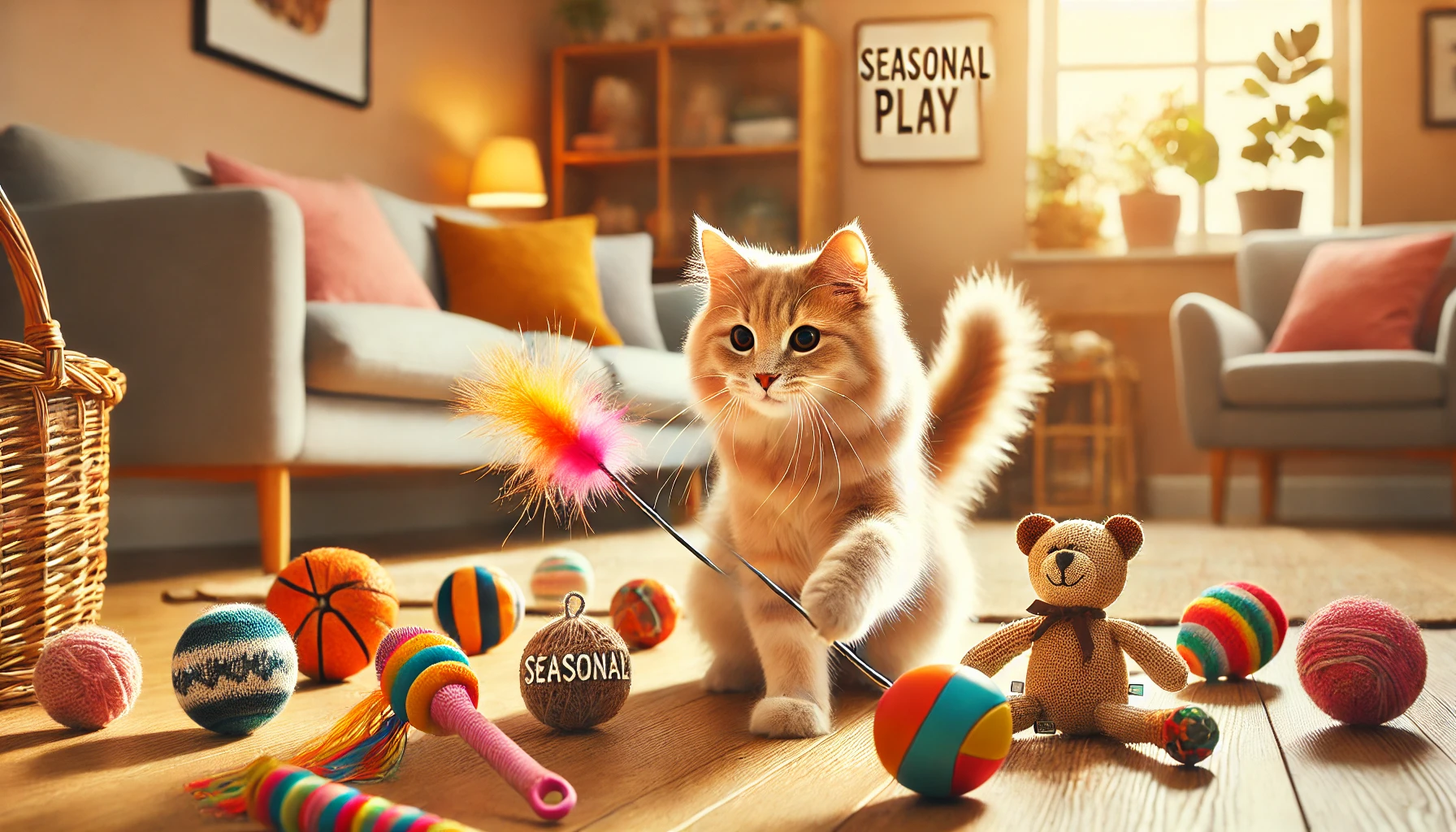
Conclusion
Regularly rotating and updating your cat’s seasonal toys is an easy and cost-effective way to keep them healthy and entertained year-round.
By investing in the right toys and rotating them frequently, you’ll enrich your cat’s life while strengthening the bond you share with them.
Seasonal toys can improve both the physical and mental well-being of your cat, making sure they remain happy and active all year round.
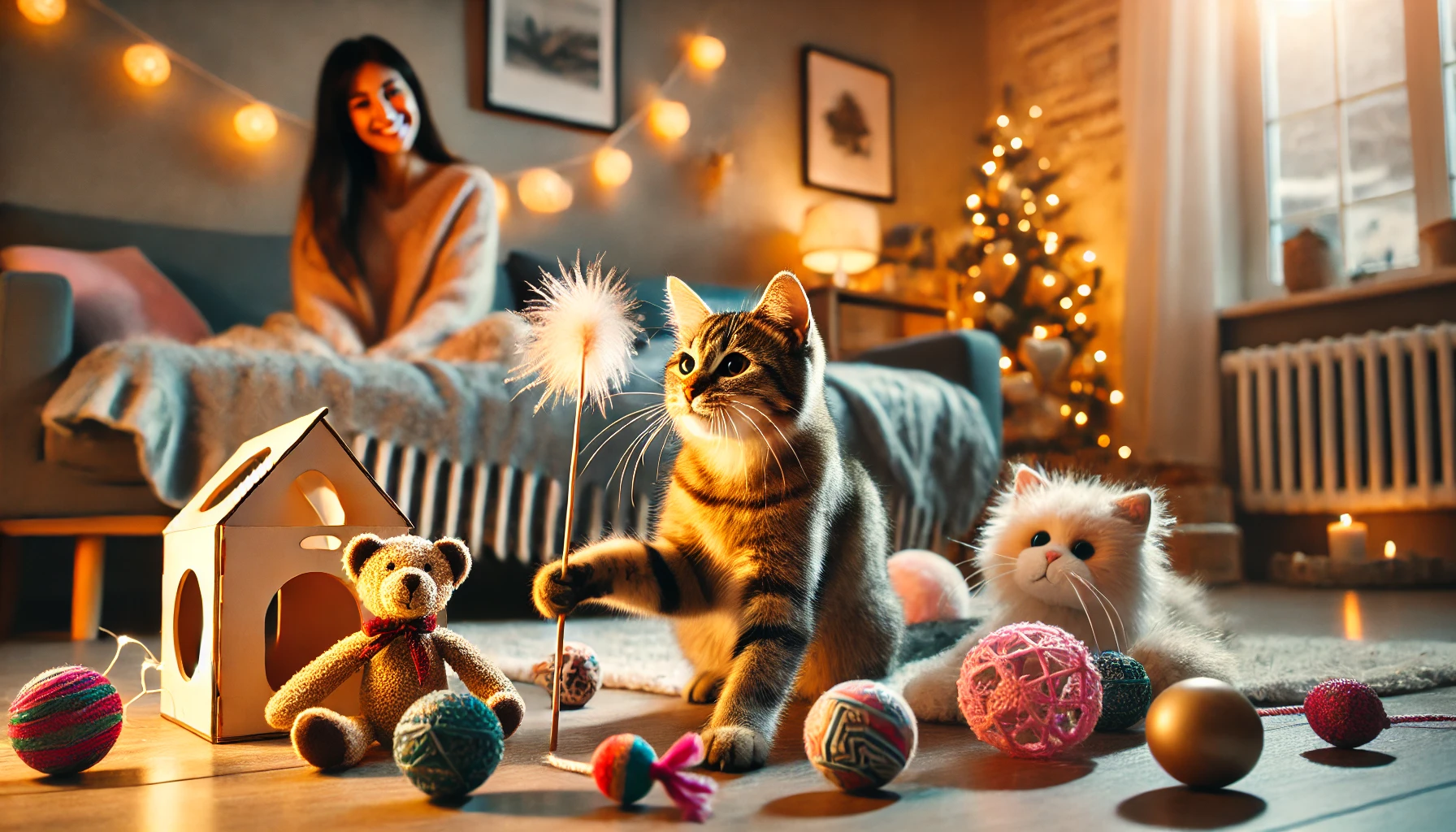
FAQs on Seasonal Toys for Cats
Here are some of the most common questions cat owners ask about choosing and using seasonal toys for their cats.
These answers will guide you to make the best decision for your cat’s playtime.
How often should I rotate my cat’s seasonal toys?
Rotate your cat’s seasonal toys every one to two weeks.
This keeps the toys fresh and exciting, preventing your cat from becoming too used to having them around.
What kind of toys are good for winter?
Plush and cozy seasonal toys are ideal for winter.
Catnip-filled plush toys or soft, interactive ones provide comfort and amusement when your cat spends more time indoors during cold months.
How do I store seasonal cat toys during off-seasons?
Store off-season seasonal toys in a cool, dry place.
If they are catnip-infused, place them in airtight containers to preserve the freshness of the catnip until it’s time to bring them back into rotation.
How will I know when it’s time to replace a toy?
If your cat’s toy starts to wear out, becomes damaged, or your cat loses interest in it, it’s time to replace the toy to keep playtime safe and engaging.


